LEADER SCOTTISH FARMING




References: 1. The production costs of anthelmintic resistance in sheep managed within a monthly preventive drench program I.A. Sutherland, J. Shaw, R.J. Shaw Veterinary Parasitology 171 (2010) 300–304.
For further information call Elanco Animal Health on +44 (0) 1256 353131 or write to Elanco UK AH Limited, Bartley Way, Bartley Wood Business Park, Hook RG27 9XA. ZOLVIX™ 25 mg/ml oral solution for sheep contains monepantel. Legal category: POM-VPS in UK. Information regarding the side effects, precautions, warnings and contraindications can be found in product packaging and leaflets; further information can also be found in the Summary of Product Characteristics. Advice should be sought from the medicine prescriber. Zolvix, Elanco and the diagonal bar logo are trademarks of Elanco or its affiliates. Use Medicines Responsibly (www.noah.co.uk/responsible). © 2024 Elanco or its affiliates. PM-UK-23-0281. Date of


NFU Scotland, Rural Centre, West Mains
NFU Scotland, Rural Centre, West Mains Ingliston, Edinburgh EH28 8LT
Ingliston, Edinburgh EH28 8LT
NFU Scotland, Rural Centre, West Mains
Tel: 0131 472 4000
Ingliston, Edinburgh EH28 8LT
www.nfus.org.uk nfuscotland @NFUStweets
0131 472 4000 www.nfus.org.uk nfuscotland @NFUStweets @nfuscotland
Editor Diana McGowan editor@nfus.org.uk

HTel: 0131 472 4000 www.nfus.org.uk nfuscotland @NFUStweets
OW often do you see or learn about something and think ‘I’m up for that’, but then never actually realise that positive thought/ silent commitment? Possibly too often or not at all.
Design & Production
Editor Diana McGowan editor@nfus.org.uk
Mark Shreeve mark.shreeve@micropress.co.uk
Managing Editor

HOW often do you see or learn about something and think ‘I’m up for that’, but then never actually realise that positive thought/ silent commitment? Possibly too often or not at all.

Andrew Hirst andrew.hirst@micropress.co.uk
Craig Gibson
Advertising Sales
Design & Production
Editor Diana McGowan editor@nfus.org.uk
Ryan Swinney
Danny Lewis 01502 725862 danny.lewis@micropress.co.uk
In this month’s magazine, our two features cover inspiring stories and highlight just how rewarding delivering on such thoughts can be both for the individual involved and others who may benefit along the way.
Welcome to the July issue of Scottish Farming Leader.
Advertising Sales
Diana McGowan
Managing Editor
Craig Gibson
Mark Tait 01502 725803 mark.tait@micropress.co.uk
Clare Stebbing clare@connect communications.co.uk
In this month’s magazine, our two features cover inspiring stories and highlight just how rewarding delivering on such thoughts can be both for the individual involved and others who may benefit along the way.
Tel: 0131 561 0024
Design & Production
Ryan Swinney
Published on behalf of NFU Scotland by COUNTRYWIDE PUBLICATIONS
Advertising Sales
Clare Stebbing
Fountain Way, Reydon Business Park, Reydon, Suffolk IP18 6SZ 01502 725800
Published on behalf of NFU Scotland by Connect Publications (Scotland) Ltd.
Printed by MICROPRESS PRINTERS LTD
clare@connect communications.co.uk
Studio 2001, Mile End, 12 Seedhill Road, Paisley PA1 1JS
Tel: 0131 561 0024
Fountain Way, Reydon Business Park, Reydon, Suffolk IP18 6SZ 01502 725800
Published on behalf of NFU Scotland by Connect Publications (Scotland) Ltd.
Studio 2001, Mile End, 12 Seedhill Road, Paisley PA1 1JS

We’re only a few weeks away from the Royal Highland Show. Over the course of four days, thousands will flock to the show to compete, judge, exhibit, organise, educate and socialise. We’ll see the best of the best and relish the atmosphere. Among the highlights and away from the main show ring, this year will see the welcome return of the Golden Shears Sheep Shearing and Woolhandling World Championships. Taking place at the MacRobert Theatre, the 2023 Worlds will see more than 30 countries compete for the prestigious title and it promises to be an action packed showcase of the art, skill and techniques required to be a world champion. Perhaps a less well known event taking place at this year’s Highland is the final qualifying round of the 2023 Britain’s Fittest Farmer competition. Taking part in this event for the first time is Kyla Graham from Kirkcudbrightshire. Kyla first spotted the event at the Show last year and while watching it thought ‘I’m up for that’. Kyla knew however she couldn’t just enter there and then. Like any competition, she understood you need to be ready for it and without knowing if she would even enjoy it, she set her mind to it to finding out if she would. Kyla shares her journey from that moment to the present and highlights how she’s benefited already in so many ways both mentally and physically, and explains about the positive impact her preparation has had on her working life.
It’s certainly been another busy month packed with parliamentary activity in Holyrood, hustings and push to make all prospective candidates aware of our manifesto asks before the 4 July General Election, regional agricultural shows, Scotsheep 2024, members’ events, webinars and road trips, to name but a few things keeping all at NFUS busy. In addition, by the time this magazine lands on your doorstep we’ll have had this year’s Royal Highland Show –we’ll review the show next month.
This month, we find out what inspired Hazel Ross from Orkney to take the plunge to not only start open water swimming but also speak up about the benefits it has for her health and wellbeing. Read more on pages 30-31. While on pages 28-29, meet the and learn how you can help support the two NFU Scotland teams taking part in this year’s RSABI’s Great Glen Challenge.
We’re only a few weeks away from the Royal Highland Show. Over the course of four days, thousands will flock to the show to compete, judge, exhibit, organise, educate and socialise. We’ll see the best of the best and relish the atmosphere. Among the highlights and away from the main show ring, this year will see the welcome return of the Golden Shears Sheep Shearing and Woolhandling World Championships. Taking place at the MacRobert Theatre, the 2023 Worlds will see more than 30 countries compete for the prestigious title and it promises to be an action packed showcase of the art, skill and techniques required to be a world champion.
businesses and organisations in five countries. This year is a special one for the Farm Safety Foundation as it marks 10 years since the charity was set up by NFU Mutual with the goal of raising awareness of, and challenging attitudes to farm safety and poor mental health in the industry. Stephanie Berkeley who manages the charity talks about the important work it undertakes and what to look out for during FSW 2024 (see pages 40-41).
As show season continues, we take the opportunity to profile the forthcoming 160th Turriff Show (pages 45-48) and flag what those attending can expect to see/get involved with. And as usual there’s all the latest news and regional, political and policy round ups.
I forgot last month to share an update on our own Robyn Kilgallon who competed in the World Cheerleading Championships in Florida in April. Team Scotland narrowly missed out on a medal but were placed fourth. Congratulations, Robyn!
Farm Safety Week (FSW) takes place from 22-26 July - a campaign managed and funded by the Farm Safety Foundation (Yellow Wellies). FSW has become an important focus in the farming calendar and is supported by more than 400 partners including the farming unions, agricultural
Perhaps a less well known event taking place at this year’s Highland is the final qualifying round of the 2023 Britain’s Fittest Farmer competition. Taking part in this event for the first time is Kyla Graham from Kirkcudbrightshire. Kyla first spotted the event at the Show last year and while watching it thought ‘I’m up for that’. Kyla knew however she couldn’t just enter there and then. Like any competition, she
Finally, if you have access to Prime Video, I can recommend putting your feet up to watch the latest series of Clarkson’s Farm. Once again, the cameras follow Jeremy, Kaleb, Lisa and the team over a growing season, tackling a variety of very topical issues, legislation and extreme weather. There are some epic fails, lessons learned, tears and successes all worthy of a watch.
The other feature looks at how a casual conversation during a Christmas lunch turned into the most rewarding and humbling experience for Next Generation Chair, Matthew Steel, one of the many volunteers who have recently delivered much needed 4x4 vehicles to Ukraine to support the war effort. Matthew explains his contribution to the ‘Pickups for Peace’ campaign and reflects on how the unexpected reception received from the Ukrainians has impacted him and those who were involved. Finally, as we head towards the longest day, with the hope of some warmer weather on the horizon, I hope you’re remembering to dress for the weather and wear protective sunscreen and hat when you’re out and about. The strength of the sun even on a dull day can prove harmful if exposed without protection. If you need a new baseball cap, visit the NFU Scotland website and purchase one from the branded merchandise in the Members’ Benefits section.
The other feature looks at how a casual conversation during a Christmas lunch turned into the most rewarding and humbling experience for Next Generation Chair, Matthew Steel, one of the many volunteers who have recently delivered much needed 4x4 vehicles to Ukraine to support the war effort. Matthew explains his contribution to the ‘Pickups for Peace’ campaign and reflects on how the unexpected reception received from the Ukrainians has impacted him and those who were involved.
“We’ll see the best of the best and relish the atmosphere”
Finally, as we head towards the longest day, with the hope of some warmer weather on the horizon, I hope you’re remembering to dress for the weather and wear protective sunscreen and hat when you’re out and about. The strength of the sun

From
Iand membership number to info@nfus.org.uk
t’s hard to believe that only last month I wrote about the changing of the guard at Holyrood and as I was due to go down to No.10 the following week. It was anyone’s guess as to how long it would be before that change may happen there too. If the pollsters are correct a change is likely to take place after the sooner than expected 4 July election. . So where does that leave us? Frankly in exactly the same place. Regardless of who’s in power both north and south of the border, it makes no difference to our lobbying efforts. We will continue to push for what’s in the best interest of this magnificent industry. By the time this edition is published we will have just held our National Hustings with the four main political parties to see how they will support us from a Westminster perspective. I’m sure by then we will have digested what each party has published in their manifesto. The most important manifesto as far as we are concerned is of course our own one. In it we lay out very clearly and simply what is required of Government to deliver on high quality food production, climate
change, nature restoration and rural communities. And most importantly, for all this to be delivered in a profitable manner for farmers and crofters. I hope the online event was helpful and filled with challenging questions and we were able to put each party on the spot and leave them all in no doubt how important this industry is for so many reasons. What we are continually mindful
policy to deliver. There are other equally important matters that are not devolved that we must keep the pressure on. For example, trade concerns where we cannot make the mistakes that were made on trade immediately after Brexit. Making sure an adequate labour force is easily accessible and doesn’t have an over bureaucratic and costly process to go through. And one we continue to push
We lay out very clearly and simply what is required of Government to deliver on high quality food production, climate change, nature restoration and rural communities.
of is that this is a Westminster Election not a Holyrood one. Although at the moment how future policy is developed remains a clear concern for all farmers and crofters and this remains a devolved issue, Westminster is still hugely important to us for so many reasons, not least because of funding issues. We could have the best policy proposals in the world but without securing a meaningful multi-annual budget in the first place there will be no
all Governments on is fairness in the supply chain with proper labelling allowing our consumers to have real clarity and not to be hoodwinked by labels that are misleading.
The election is only a few days away and regardless of the efforts we have gone to so far to secure commitments from prospective parliamentarians, the real work starts post-election to make sure whoever is in power delivers on what this industry needs.
From its unmistakable Buckbootz ‘Hard As Nails’ profile to its rugged good looking dealer boot styling B1180 carries its Buckbootz heritage and branding with pride. With its extended whole cut vamp and beefy heel counter this is a waterproof safety boot with gravitas and real substance.
Using construction and components designed to withstand the roughest treatment, B1180 combines strength with light weight thanks to an aluminium toecap, kevlar midsole and the new Buckbootz K11 dual density sole. K11 lets us retain all the legendary Buckbootz rubber outsole durability and features which now include ladder grips, at a weight saving which will win over a new generation of Goodyear welted safety boot wearers. With Buckbootz characteristic attention to detail we lock stitch the toe plate and beef up the outer sole rubber depth at the critical heel/ground also brings three dimensional Buckflex fitting with three flex-stretch areas at the boot collar. This makes fitting and removal a stroll in the park and enables the collar to retain its neat look and snug fit at all times.

• Lightweight Dealer boot
• Dark Brown Crazy Horse Leather
• Waterproof
• EN/UKCA safety codes SB PS HRO FO LG WR/WPA
• Aluminium safety toecap
• Non-metallic anti penetration NAIL STOP midsole
• Slip resistant
• Heat (300ºC/60 secs) and Oil Resistant Rubber Outsole with Ladder Grips
• K11 dual density weight saving sole
• Wider fitting at toe area
• Buckflex three way flex-stretch collar
• Sizes 6/40 to 13/47


Go to www.buckbootz.com.
To find your nearest Agricultural Merchant stockist call 01382 82 82 00 or email info@buckbootz.com
We offer advice and support to assist you with what matters most – running your business.
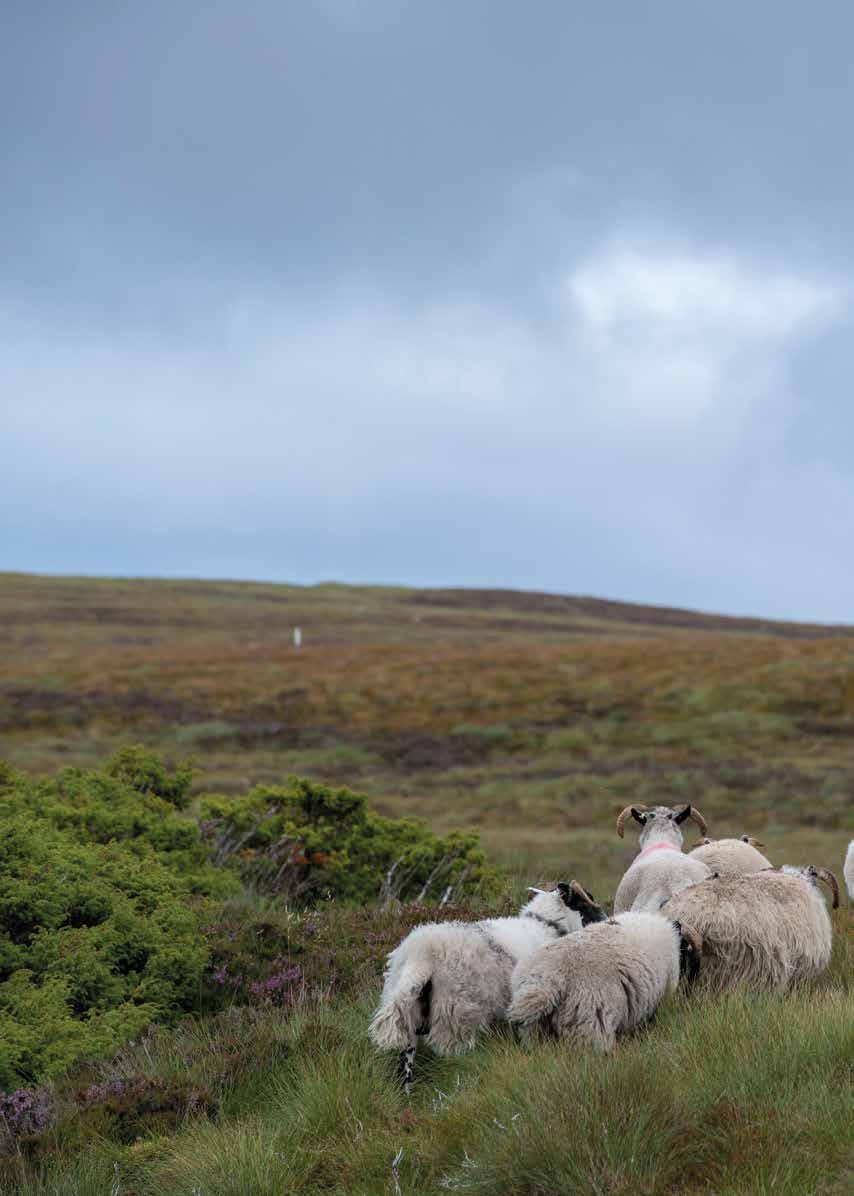
Find out what our team could do for you: shepwedd.com/rural-disputes

WAndrew Connon Vice-President
(overseeing
Food & Farming Policy)
ell, what a difference a month makes! The countryside has changed colour rapidly, encouraged by drier weather, better ground
deforestation worldwide and its resulting impact on soya. I’ve therefore been engaging with AIC and other stakeholders to establish the facts and avoid any alarm within the market.
Members across sectors are concerned about regulation in the UK and EU seeking to minimise deforestation worldwide
conditions and heat! As I write at the start of June, I’m conscious that May saw considerable activity within the Union over and above the big-ticket items of Ag Bill and Land Reform and I’ve attended numerous events, shows, Committee and Monitor meetings in the process.
Members across sectors are concerned about regulation in the UK and EU seeking to minimise

SAlasdair Macnab Vice-President
A visit to the ABP Open Day proved very interesting. It was great to see investment, but we must fight hard to maintain the beef cow herd in order to sustain the supply chain.
Attending the Farm Safety Foundation 10th Anniversary Conference in Birmingham as a panelist, I heard of the progress made in dealing with mental wellbeing but was also reminded about
(overseeing Climate, Land & Business Policy)
ince last year’s Highland Show when we went public with our opposition to the Bute House Agreement, it’s been a rollercoaster for NFU Scotland. From
opposition to a new National Park, the issues with ownership and use of our data.
Meetings with politicians need preparation and clear focus on what we want to achieve. The measure of success
With forthcoming parliamentary elections over the next two years, we all need to effectively spread the message of what we actually do.
a new CEO, new business strategy, and huge range of industry critical consultations to responding to day-today issues such as weather, climate challenges, labour, and more. There is no prospect of the pace letting up soon.
I’m working with staff and members to lobby MPs and MSPs on not just the core issues such as our election manifesto and proposed legislation, but also on our
is achieving our target outcomes. This needs a persuasive case which stands up to scrutiny. Members’ personal experience and knowledge is key to presenting our case effectively.
We have an urban-centred population in Scotland which is largely unaware of what we do, gaining much of their information from internet connections. Members can lobby for the Union very
the fact that UK Agriculture’s accident and fatality record remains a huge concern with much improvement still needed. Look out for Farm Safety Week 22-26 July and let us all ‘Rethink the Risk’ and avoid cutting corners while working.
The Show Season is now well under way. We’ve had tremendous engagement with members and stakeholders at these important events already and I look forward to meeting up with many more of you all over the next couple of months.
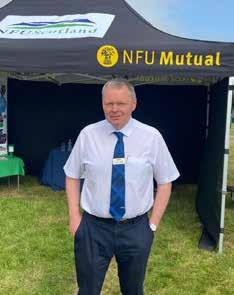
effectively by hosting visits to farms and crofts to help MSPs, MPs and the public understand the impact and consequences of political decisions on our lives and businesses.
With forthcoming parliamentary elections over the next two years, we all need to effectively spread the message of what we actually do. Our regional managers, political team, Board members and Presidential Team will provide support, planning and briefing for meetings and attend if required.
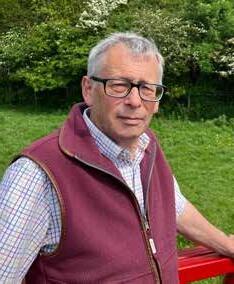
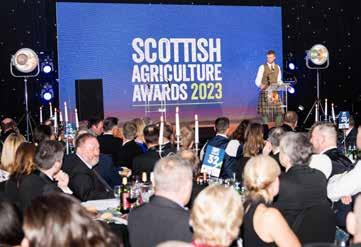
The achievements of the Scottish agriculture sector will be celebrated at The Scottish Agriculture Awards 2024, held in partnership by AgriScot, RHASS and The Scottish Farmer on Thursday 24 October at the DoubleTree by Hilton, Glasgow Central. And NFU Scotland is a major sponsor and co-ordinator for two big awards.
Farming’s Future Award - This category will recognise an individual under the age of 35 who champions the sector or has an unrivalled passion for agriculture. They should be an individual who strives to better themselves and their career through ongoing education or innovate ideas, and someone who will be the future of farming for years to come.
On behalf of sponsors Thorntons, we are co-ordinating Mixed Farm of the Year. This new award for 2024 aims to recognise a mixed farm which combines crops and livestock production. The farm should deploy complementary strategies to deliver overall success for the farming enterprise while balancing productivity with environmental stewardship, contributing to the resilience and prosperity of the operation.
Nominations are being taken until the deadline of 11 July. You can find a full list of the categories and guide on how to enter can at www.newsquestscotlandevents.com/events/agriawards-event/
Funding provided by NFU Mutual has enabled the National Rural Crime Unit (NRCU) to recruit Martin Beck, who has 30 years of policing experience in the field, as its first UK-wide livestock theft prevention officer.
His new role involves gathering livestock theft-related intelligence across the UK, though a new initiative code named Operation Foldyard. It will gather and share information on new theft trends and work with local police forces to build cases and help secure convictions.
Martin’s appointment comes as the toll from livestock theft reached an estimated £2.7 million in 2022, according to the latest figures from NFU Mutual.

In May, President Martin Kennedy joined more than 100 UK food and farming representatives and Cabinet Ministers at the second annual Farm to Fork Summit held at 10 Downing Street, London. Hosted by Prime Minister Rishi Sunak MP, the event was aimed at recognising the crucial importance of the farming sector while assessing opportunities available to help it progress.
At the event, the Prime Minister revealed the UK Food Security Index. This new framework has been designed to allow the government, agricultural industry, farmers and crofters to monitor annually impacts of external factors on food production.
Afterward Martin welcomed the Index saying, “Food security is something we have taken for granted for too long. The impact of severe weather on farms over the past year and the long-running conflict in Ukraine has shown us we need to have food security higher up the agenda.
“The new Food Security Index will hopefully allow the UK Government and farming sector prepare themselves for future barriers to sustainable and profitable food production. If we focus on our own food production industry, farmers and crofters will not only deliver for our consumers but we will continue to look after the environment and combat climate change.”
Throughout the event, Prime Minister Rishi Sunak emphasised the importance of technology as the way forward for farming. After a garden reception celebrating UK food production, Martin attended a breakout session on growing an innovative sector where gene editing, automation, research and development, net zero innovation, and artificial intelligence, were all discussed.
The Prime Minister also pledged £80 million to support the horticulture sector in a bid to reduce imported product. While Martin was in support of this commitment, it remains unclear whether this will be implemented in all devolved nations.
Martin concluded, “Speaking to representatives from the UK farming sector, UK Farming Union leaders and MPs at the Summit, the Prime Minister has committed to continue to invest in and support farmers to produce the best of British food to strengthen our food security and championing innovation in the sector.
“That’s a commitment that we would be looking to any future UK Government to uphold.”
Our Less Favoured Areas (LFA) Committee used the payment run under the latest round of the Scottish Upland Sheep Support Scheme (SUSSS) to call for extensive grazing to be part of future support plans.

Scottish Government confirmed in May that 97 percent of the eligible applications to SUSSS were processed. The scheme, valued at £7 million, has been running for nine years and supports home-bred ewe hoggs on extensive hill farms and crofts.
This year’s payment rates are much the same as the year previous at £61.38 per eligible ewe hogg (vs £61.25 in 2022). At 115,627, there was a very slight drop in the number of eligible animals, while the number of eligible businesses remains stagnant at 1134.
Chair of the LFA Committee Peter Kennedy, a hill farmer from Glendaruel in Argyll said: “While it’s hugely positive that the scheme has provided continual support to our hill farmers and crofters for nine years, we must turn our attention to how the livestock producers in some of our more remote and challenging areas will be supported going forward.
“Scottish Government has been clear that coupled support is changing as part of the current agricultural policy reforms.
It has committed to continuing SUSSS in 2025 and 2026 but it may be delivered using a different model.
“The LFA committee at NFU Scotland wants the importance of livestock grazing in the disadvantaged areas to be a significant part of that future policy debate.
“Our favoured model is for a Disadvantaged Area Support package to be created, under Tier 2 of the proposed new arrangements, which recognises and rewards the role of extensive livestock grazing and management in delivering public goods. Notably biodiversity enhancement, habit management and carbon sequestration.
“While other areas of future support look to reward productivity and efficiency for contributions to climate mitigation, it is of equal importance that extensive livestock farming and crofting is also supported.
“Two simple support packages are needed. One for extensive cattle management and one that replicates the many benefits that SUSSS has delivered to those who keep sheep in Scotland’s hills and uplands in the past nine years.”


Our first Quarterly Successes Report has been sent to all members via email. This is a new communication format for NFU Scotland, aimed at highlighting our key successes through a three-month period and securing member retention. In this first report of 2024, the AGM, ShelfWatch, NFU Scotland Finance, political engagement and policy wins, were summarised in a graphical layout. We’re working on our Quarter Two Report and would appreciate feedback from members and staff on how to develop this document, going forward. The report is also available via our website: www.nfus.org.uk/ quarter-reports.aspx
Rory Christie is a partner in the Dourie Farming Company Ltd., a dairy and piggery business that he runs with his brother Gregor in Wigtownshire, Southwest Scotland. Rory, founder of the co-operative The Milk Suppliers Association (MSA), oversees the dairy farm where 1100 dairy cows calve in February and March each year and spend the majority of the year outside. Gregor takes care of the pig side of the operation which is an indoor Danish-like system.
A family business started by their grandfather and now stretching 70 years in operation, there have been many ups and downs over those years with significant challenges impacting Rory. This podcast finds out more about the business and is a very honest and open account delving into how Rory defines success and how he copes with and has managed the stress he encounters. Download this episode of Blether Together via www.farmstrong.org.uk .
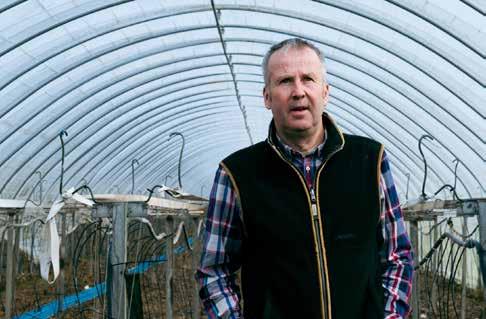
Iain Brown, Horticulture Working Group Chair and a soft fruit and vegetable grower in Fife said:
“Securing a commitment to a fiveyear extension to the Seasonal Workers Scheme from the UK Government is a hard-won victory following years of lobbying on this vital scheme for Scottish growers. Faced with labour shortages, introducing a minimum five-year rolling seasonal workers scheme with a suitable length visa and no cap on worker numbers was a key ask of our General Election Manifesto. We understand that 43,000 visas will be available to the horticulture sector across the UK in 2025 and that

We were delighted to host livestock delegations from the other UK farming unions recently. The livestock chairs and staff from NFU, NFU Cymru and UFU enjoyed a packed agenda that saw them take in a working bovine EID demonstration. Bovine EID is on the radar of all UK farming unions. The group also visited the world-leading livestock animal health and welfare research facility at Moredun as part of the visit.
further detail on the number of visas to be available from 2026 to 2029 will be set out later this year. The extension is a positive development and will come as a relief to the many soft fruit and vegetable businesses in Scotland who rely heavily on migrant seasonal workers to ensure our crops get harvested each year. The fiveyear extension provides a significant degree of reassurance and allows these businesses to plan ahead. We’ll continue to lobby for further necessary improvements to the scheme. That will see us continue to challenge the cost of the scheme and the regulations which go along with it.”
Farmers across the UK are being urged to be vigilant after a new wave of Global Positioning System (GPS) thefts in recent weeks, NFU Mutual and the National Rural Crime Unit (NRCU) have warned. They are urging farmers to take all possible steps to protect their GPS equipment - Activate PIN security on GPS kit with your own unique number if available; Mark your postcode on the unit’s case to deter thieves and trace your property back to you; Keep tractors and combines with GPS fitted stored out of sight when possible; Remove GPS kit when possible, from tractors and other machinery and store it securely; Record serial numbers and photograph your kit; Check serial numbers of secondhand kit offered for sale.
Ruminant Health & Welfare and AHDB are advising farmers to ‘act’ on BTV-3 by being aware of how bluetongue is transmitted as a vector-borne disease, while providing caution against misinformation, and promoting evidence-based tactics on-farm.
Awareness of how BTV-3 is transmitted as a vector-borne disease.
Caution against any misinformation, but instead view the latest facts.
Tactics on-farm to help with midge control must be evidence-based.
In the UK, bluetongue, including BTV-3, is a notifiable disease, so anyone suspecting the disease must take action and report it to the Animal and Plant Health Agency (APHA).
Further information about how to ACT on BTV-3 and the latest updates please visit ruminanthw.org.uk
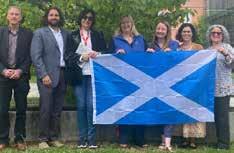
Scotland’s agritourism sector, and its lead Caroline Millar, are celebrating after winning a bid to host the World Agritourism Conference in 2026. The announcement was made in Bolzano, Italy at a gathering of world leaders in agritourism. The international conference in 2026 will showcase the diversity and growth of Scotland’s agritourism sector on a world stage and it is expected that up to one thousand delegates will attend. The main conference will take place at the P&J Live, on the edge of Aberdeen, from 23 to 25 June, with a pre-conference programme in the Edinburgh area to include a visit to the Royal Highland Show. Pre and post conference tours ranging from one to ten days in length have been developed which will welcome delegates on to farms and crofts in every part of Scotland from Orkney to Dumfries and Galloway. More details are available on scottishagritourism.co.uk

Sow the seed of sustainability and explore renewable energy options for your business with NFU Energy’s one-stop-shop service.
How it works:
• We identify the best renewable energy solution for you.
• We introduce you to one of our approved installers.
• We help you secure finance and insurance.
• We provide ongoing support.

If you’re interested in finding out which renewable energy system is best suited for your farm, then give us a call today!
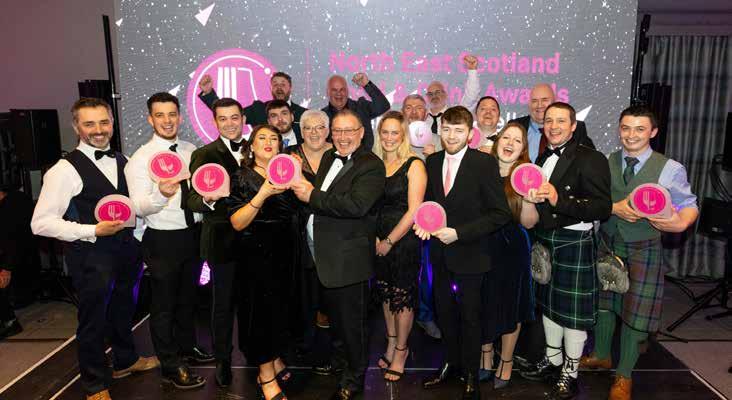
Congratulations to all the winners of the 2024 North East Scotland Food & Drink Awards delivered by Opportunity North East (ONE) in partnership with Aberdeenshire Council. The awards celebrate
excellence and innovation in north east Scotland’s food and drink sector. Winners of the 2024 awards across nine categories – including best new products, innovation and growth –were AGD Duff & Partners, Amity Fish Company, Associated Seafoods,

We’ve joined forces with a leading solar power and battery developer to help Scotland hit its climate goals while providing a valuable new income stream for working farms and crofts. This new affinity deal with Iqony Solar Energy Solutions (UK) (SENS) aims to ensure that only a marginal amount of productive farmland is used for solar installations. Working closely together
we’ll use our detailed knowledge and relationships with members to help identify sites that are suitable for Photovoltaic (PV) technology and battery projects. SENS will develop the sites and own them for the long-term and the landowners will then receive an indexed, competitive market rent for the land for up to 40 years. For more information please the members benefits section of our website.
Burnside Brewery, Little Brown Dog Spirits, Reynolds Cocktails and Singularity Sauce Co. Fraser Chapman, a trainee auctioneer with ANM Group received the rising star award and SeaFest Peterhead landed the best food and drink tourism experience title.
NFU Scotland Finance, a dedicated division of Anglo Scottish which offers bespoke business finance solutions to NFU Scotland’s 9000 members, has completed its first £1 million of business. NFU Scotland Finance offers tailored loans, commercial mortgages, asset finance, business credit cards, and refinancing opportunities to members.
In its first few months, NFU Scotland Finance has assisted members with business loans and funding for agricultural vehicles, commercial vehicles and robotic milking machines.
NFU Scotland Finance is confident that it will shortly achieve its second milestone of £2 million with credit approval already received for requests to support asset re-financing; business loans, machinery purchases and further interest in robotic milking systems. Members can start their quote at: www.angloscottishfinance.co.uk/ asset-finance/nfu-scotland-finance/

Beatrice Morrice Political Affairs Manager

Walker

With the UK General Election announced for 4 July this year, we continue to ensure that all parties understand our key asks and seek commitments to support the agricultural sector. We published our manifesto in April and we have been engaging with prospective parliamentary candidates and underlining the importance of Scottish agriculture to food production, helping to tackle climate change and enhance biodiversity.
The Agriculture and Rural Communities (Scotland) Bill is nearing the end of its parliamentary process. We’ve continued to engage with MSPs during these final stages ensuring that our position on amendments being considered is understood. We have called for a multiannual funding commitment to be included on the face of the Bill to provide certainty to the sector and enable farmers and crofters to invest, plan better and deliver on the required outcomes of the Scottish Government’s Vision for Agriculture.
In May, we met with the Cabinet Secretary for Rural Affairs, Islands, and Land Reform, Mairi Gougeon MSP, to further discuss the Bill in advance of Stage 3 consideration and debate.
The Circular Economy (Scotland) Bill has been considering amendments over recent weeks. During this time, NFU Scotland encouraged MSPs to support amendments that were lodged relating to fly-tipping. Some of these were passed at the end of May which we welcomed. We know that fly-tipping can cause a wide range of problems and waste crime is becoming an increasingly more visible issue. We believe a new approach is needed to turn the tables on this crime for good.
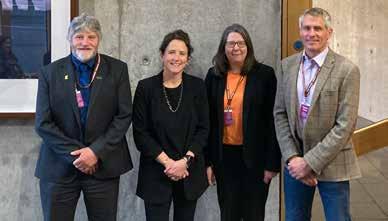
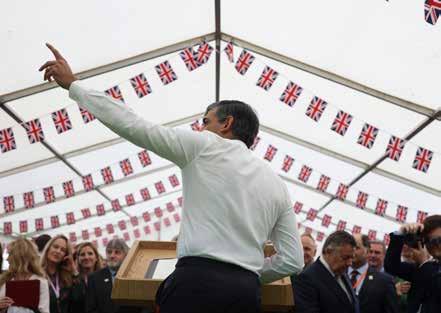
NFU Scotland President Martin Kennedy attended an event at No 10 Downing Street with other food and farming representatives in May. This was the second annual Farm to Fork Summit, hosted by Prime Minister Rishi Sunak MP, and it aimed to recognise the crucial importance of the farming sector while assessing opportunities available to help it progress. Read what Martin had to say after attending the event in the news section (page 4)
Areception was held in the Scottish Parliament in May that provided MSPs with an opportunity to engage with the Food and Agriculture Stakeholders Taskforce (FAST). NFU Scotland, along with other members of FAST, met with MSPs and championed Scotland’s agri-food sector. With the Agriculture and Rural Communities (Scotland) Bill currently going through the Scottish Parliament, the event provided the opportunity to underline the importance of agriculture to the economy and the progress being made in sustainable and regenerative farming.



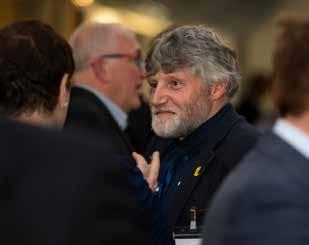



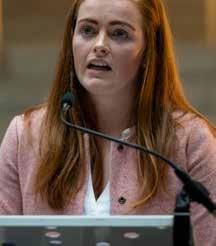

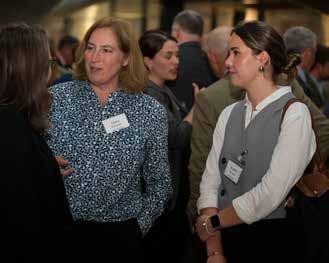
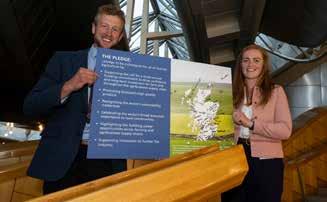


Tracey Roan Policy Manager
One of the biggest challenges facing the Scottish dairy sector today is the lack of investment in processing and the opportunity to add value from cow to consumer.
So, a welcomed announcement at the UK Farm to Fork Summit in Downing Street was that Arla is pledging to invest tens of millions in its production sites to boost UK manufacturing and the future of British dairy, totalling over £300 million.
In addition to previously announced plans for its Taw Valley site, Arla Foods will update and expand its dairies and creameries, including Lockerbie, seeing a £34 million upgrade project to implement new technology.
Bas Padberg, managing director of Arla Foods UK, explained: “What this means is that our farmer owners are investing in UK food security – as they are not only producing our milk, but they are backing this investment in our production sites. Dairy plays a significant role in the UK economy, with sales of dairy products exceeding £8bn*. On the day of the Farm to Fork Summit we were delighted to set out plans for continued vital investment in our business worth tens of millions of pounds, ensuring the UK remains at the forefront of food production and keeping the nation’s favourite dairy products on our supermarket shelves.”
Is the Market starting to turn...?
As I write this, the latest GDT has increased by 3.3% on average, reaching its highest price since October 2022.
The latest AHDB GB daily milk deliveries suggest that we have passed the peak, and that production is back 2.1% year over year.
Several processors lifted their payments in May, and if markets remain buoyant, further gains are forecast in the coming months.
Improved domestic demand and tight supply for the time of year are both helping to drive the market up in the short term.
Defra has announced that Richard Thompson is the new Agricultural Supply Chain Adjudicator (ASCA) who will oversee the enforcement of the UK milk contracts regulations that come into force on 9 July. The role carries statutory backing to investigate and decide whether a processor has breached the regulations and to impose penalties of up to one percent of turnover where breaches are found. The adjudicator will also be able to instruct non-compliant processors to pay compensation to milk producers.
NFU Scotland, along with the other UK Farming Unions, will engage with the ASCA and establish regular communication as the new milk contract regulations are rolled out.
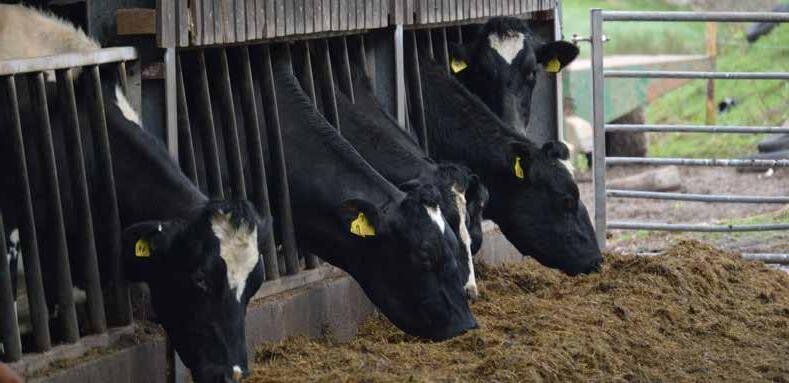

Ian Davidson Scottish Land Matching Service
With the Highland Show behind us we now await the outcome of the UK General Election – going to be interesting times ahead as things start to settle after the fast and furious six weeks of campaigning. Let us hope


Lucy McGillivray Policy Advisor
Iwhoever is in power recognises the huge part that a vibrant rural sector plays in society and that supportive actions not words are the norm.
The Service continues to be very busy, and many will have noticed we now have a presence on Facebook. It has been really heartening to see the response and following that communication channel has generated. A big thanks must go to our admin support, Mandy Dailly, who has done so much work on setting the page up and keeping the feed up-to-date.
I spoke earlier in June at the Scottish Land Commission Conference in the session entitled “Supporting small-scale – collaborative approaches for improving access to land for
small-scale land management and use”. I will give feedback in future editions on the discussions that took place, but my main messages were around how we encourage more opportunities – e.g. can publicly owned land do more or are their legislative “fixes” required. I also highlighted things that people need to think about in small-scale collaborative ventures, not least of which is viability and sustainability as well as finding innovative agreements that work for both parties.
With show season in full swing, we will be out and about across the country and look forward to meeting with people who have queries about SLMS and how we might be able to help them.
n May, the Next Generation Committee had the opportunity to learn more about the Land Reform Bill (LRB) and the parliamentary processes at an online meeting with presentations from Rhianna Montgomery and Al Walker. We also extended the invite to SAYFC’s Agri-Affairs Committee, as we share common interests.
We felt engaging the next generation on this key Bill was important, as it will be their future that will be affected by the proposals.
The overall aim of the meeting was to upskill the Committee in their knowledge of the Bill, but also crucially to get their views on the proposals to inform our written submission. Both presentations sparked interesting discussions between attendees, with some key takeaways.
Firstly, despite some who may believe the Bill will offer opportunities for the next generation, the general feeling was that the proposals are worrying. Tenancies are beneficial for next gen because they provide a vital access point for people who don’t own their own land. Sadly, they are already in short supply and hard to get access
to. The group feedback was that the proposals in the Bill could risk taking more land out of tenancies therefore reduce access to land. Many new entrants can’t raise the funds to be able to buy land with the price that it is, therefore, a tenancy is usually the first step in their journey.
On the proposal lotting of land for sale, it was agreed it is a slippery slope with worry about where this ends.
There was concern about the 3,000ha threshold and if this will change in coming years, if reduced further it could start affecting more farmers and this is surely not what the LRB intends to do.
Lastly, in terms of large-scale
estates, the group’s view was that big isn’t always necessarily bad. Often there are opportunities for new entrants to get a start by managing an estate farm or taking on a tenancy. Estates also support the wider rural economy, providing employment for young people, and not just in agriculture. They can help keep rural people in rural communities.
Overall, the meeting was very useful, and the comments were used to form part of the Union’s submission to the Net Zero, Energy and Transport Committee. We hope you found this meeting useful and thank you to all who attended.

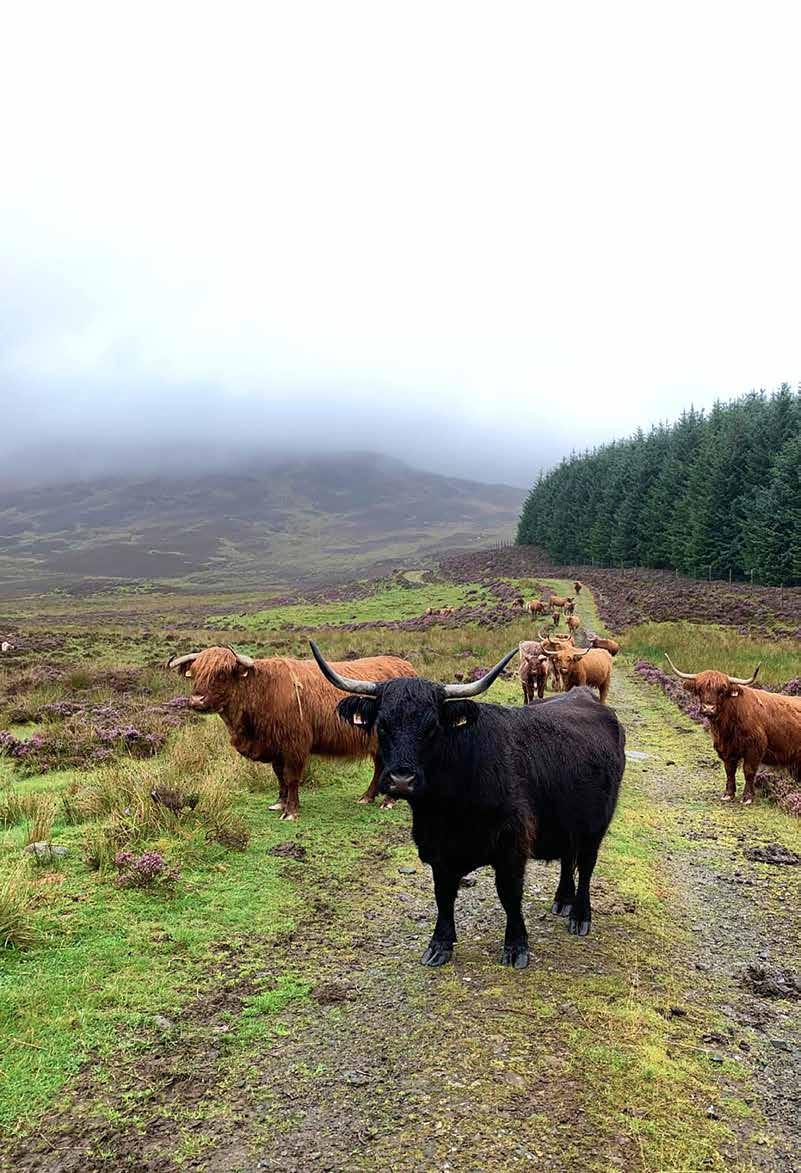

Lisa Hislop Policy Manager

Scottish Government’s consultation on Cattle Identification and Traceability has just closed, this is the product of years of industry discussion, lobbying and research and development by ScotEID. While many might ask why we need a consultation for a policy which was promised over 20 years ago, particularly when it was introduced in sheep several years ago, the consultation process must be followed to progress the introduction of Bovine EID in Scotland.
Our position is clear, we want to see a mandate for the introduction of Ultra-High Frequency (UHF) EID. This is the newer technology versus
the now dated Low Frequency (LF), which is used in sheep. The benefits of UHF outstrip those of LF, notably the ability to achieve 100 percent read rates on-farm, in transport and in markets which improves the health and safety of anyone who works with cattle. It will be able to streamline the husbandry tasks on-farm including the inspections, as well as the potential to phase out paper passports, saving the industry over £20,000 and the Government over £500,000. There can be a lot of confusion and misunderstandings around EID which is fair given the time taken to get to this point. But fundamentally UHF EID gives those who want to use technology the opportunity to get the most
out of it, however if someone doesn’t, the tags will continue to be ‘What You See Is What You Get’ (WYSIWYG), meaning the animal’s ID will be printed on the tag and you could request a paper passport as is today. This also mitigates any concern about cross-border trade.
We would like Government to introduce the mandate with a clear timeline for introduction as soon as possible. This will give industry confidence to invest in production. We would also like to see capital funding available for the transition to EID through the future support framework. As the industry is encouraged to use data to become more efficient, we need the policy and tools available to do so.
Speed of reading
Max reading distance
Health & Safety
Compatibility with existing EID management Systems
Susceptibility to interference
Scope for further innovation
Cost
Suitability for management purposes
Suitability for traceability purposes
Slow, one at a time
Fast, multiples simultaneously
Short, 12cm to 18cm Long, several metres
Poor - reading rate too short
Low – collisions between multiple LF devices
High – adversely affected but nearby metal and electronic signals
Non-mature technology restricted to niche applications
Relatively high, accounting for functionality
Medium – acceptable where immobilisation of animals occurs
Low- slows speed of commerce at key points of supply chain
Good – long reading range
High – does not interfere with LF devices nor other UHF devices
Low – impairment can be avoided via reader configurations
Low – vibrant technology applied across other areas of the economy
Low, accounting for functionality
High – with or without animal immobilisation, reader power can be varied
High – works at speed of commerce across supply chain.


Sarah Cowie Senior Policy Manager
As you may be aware, as part of the new agricultural support scheme, farmers and crofters will be required to complete a biodiversity audit in order to unlock their basic payment. This will be a component of the Whole Farm Plan. NatureScot are currently developing a Biodiversity Audit App to help farmers and crofters map existing habitats and features on their farms and crofts and measure their condition.
The concept of an app being able to identify and measure biodiversity on
farm is both exciting and daunting. For starters, the app needs to be practical, realistic and workable for farmers to use. NatureScot are now testing this app with a wide range of farmers and crofters across Scotland to make sure this is the case.

I’m pleased to say that at the time of writing, over thirty of our committee members have signed themselves up to test this stage of the app. They will now be in the process of creating a habitat
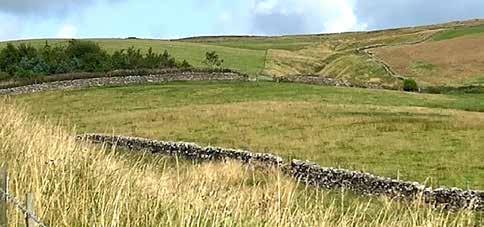
map for their whole farm and allocating a habitat category to all the land within the business.
Biodiversity on farmland is essential to Scotland, and farmers are essential to managing, retaining and restoring important habitats. That is why NatureScot has focussed on habitats and features on farms, but there will also be a chance to record plants and animals if you wish.
This feedback our members can provide on this app is crucial as the end result will inform the biodiversity audit component of the Whole Farm Plan.
While the deadline for signing up to test this stage of the app has now passed, we hope that there will be more opportunities to feedback our thoughts in the future.






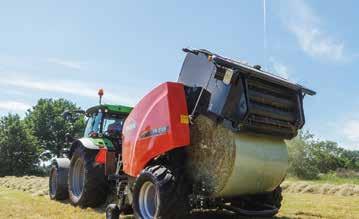










TAndrew Connon Vice-President (overseeing Food & Farming Policy)
he countryside has responded hugely to the recent warmer, drier weather and crops have leapt through the growth stages. At start of June, Nov Futures were sitting at £216 and May Barley trading today at £190. At the last Combinable Crops Committee meeting, digital grain passports were discussed yet again, with contributions and perspectives heard from AHDB, AIC, Maltsters, SQC and NFU England. I hope that by the time this issue is in circulation, the revised business case is being reviewed for the final time and decisions can be made.
Farm Assurance continues to provoke debate and it was pleasing to hear from SAOS on a project currently being undertaken to compare Assurance Standards between our own and other countries. This is important work especially bearing in mind the recent volume of debate on imported grain. Demand for our grain remains strong and there has been welcome news about malting capacity growth and Grants at Girvan adding another 75,000t of demand for wheat to the grain sector.
Potato planting continues at speed after a late start to the season and hopefully the warm soil temperatures will allow crops to catch up. The

TGemma Cooper Head of Policy
he policy team is currently grappling with not one, but two large pieces of draft legislation currently. As well as the Agriculture and Rural Communities (Scotland) Bill, the Scottish Government has published its latest Land Reform (Scotland) Bill.

Following extensive member engagement, we have submitted a response to the Net Zero Energy and Transport Committee. Many thanks to members who engaged with us by attending our national webinar, multiple meetings for Legal and Technical and Environment and Land Use Committees and Tenants Working Group. Without member engagement, we couldn’t submit a robust response on your behalf.
The Scottish Government is clear that it has an ongoing commitment to land reform. And much of the current focus is land ownership. Whilst the content of the Bill is largely unsurprising, there are some aspects where we have concerns over potential impact for members.
Part 1 of the Bill covers regulation of land sales, introduces a new Commissioner for the Scottish Land Commission, new community rights and compulsory land management plans.
Part 2 has a new ‘Land Management Tenancy’ and includes changes for current tenancies on issues such as rent review, resumption, good husbandry and good estate management.
decision by DEFRA to stand firm on the pending ban on Mancozeb has caused a lot of activity in trying to look at common sense. As an industry we’re asking for an impact assessment as well as a risk-based review. Opportunities for the use of mineral oil are also being looked at.
The quest to obtain the residual AHDB levy funds for the industry continues and it’s hoped that this process will proceed despite the impact of General Election activities.
Water management, storage and abstraction, is also a hot topic and ways of securing capital grant funding through future Agricultural Policy in Tier 3 are being explored.

Our full response is on the website, some key points are:
• We don’t support the proposal for holdings over 3,000ha to prepare and consult on a land management plan.
• We don’t support lotting of holdings over 1,000ha or new community rights.
• We don’t support the new Land and Communities Commissioner provision.
• We are concerned about how the new Land Use Tenancy may impact on tenant members.
• We are supportive of updating agricultural holdings on issues such as rent review, moving to a principles-based improvement list and providing fair compensation. We feel further conversation is needed about the balance of some proposals to ensure they don’t’ impact on availability of future tenancies.
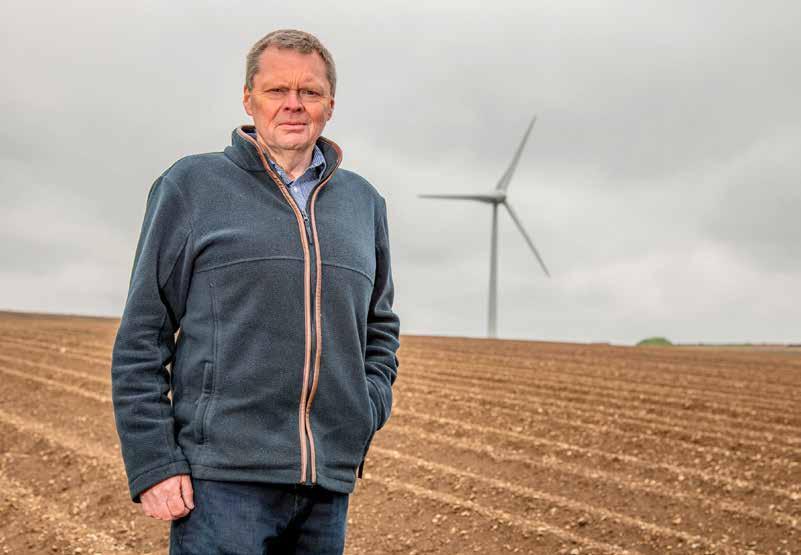

Penny Middleton Policy Manager
In May, a case of classical Bovine Spongiform Encephalopathy (BSE) was confirmed in a beef cow on a farm in Ayrshire. Precautionary movement restrictions were put in place at the premises and tracings found a small number of cohort animals on other farms. Cohorts are animals born, reared, and fed with the affected animal. Officials will cull and test cohorts as a precaution; they will not enter the food chain.
Officials found the case through routine surveillance and the stringent control measures in place. The animal did not enter the human food chain and proves the efficacy of the measures in place to identify cases and protect the food chain. Food Standards Scotland have confirmed there is no risk to human health because of this isolated case.
The last case of Classical BSE in Scotland was in 2018, similar sporadic cases have been seen in England,
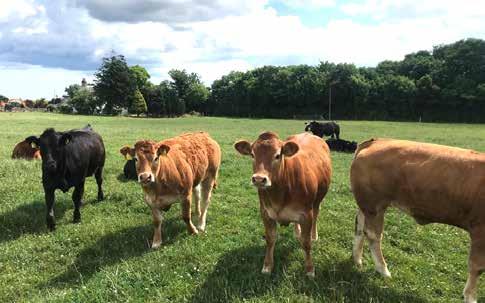
Ireland, and France in the past decade. The owners of the affected animal will be working with authorities to establish a possible cause of infection. Officials have 90 days to provide to WOAH with the outcome of their investigations for this case.
This case will not affect our ability to apply to World Organisation for Animal Health (WOAH) for negligible risk status this summer if we can demonstrate any identified source of infection has been controlled and the risk of BSE
agents being recycled within the bovine population continues to be negligible.
The case whilst disappointing is a testament to the effective surveillance we have in place, strengthening our application for negligible risk status, based on the efficacy on our control measures. We must commend the communication teams at Scottish Government and here at NFU Scotland, in managing the initial press enquiries and ensuring a largely measured and responsible press coverage.
We are a farm waste management company, based near Dundee and have been trading for 14 years.
The types of waste we accept includes: Silage Wrap, Fertiliser Bags, Chemical Drums, Cardboard and Feed Buckets. Mixed loads of waste are accepted to make it as easy and affordable as possible for farmers to dispose of their waste.
Skips also available for scrap metal. Give us a call to discuss your requirements.









Jonnie Hall Director of Policy
Here we are, halfway through 2024. As I write, the Agriculture & Rural Communities (Scotland) Bill is set to complete Stage 3. That will create the primary legislation and powers to replace existing, and familiar, CAP schemes with the new four-tiered structure of ‘conditional’ support kicking in from 2027.
The Scottish Government’s Agricultural Reform Programme (ARP) maps out significant milestones over coming years. With every milestone, farms and crofts across Scotland will have to adapt to and embrace change.
It’s clear that 2025 will be a year of change. The blunt message is ‘Agricultural support is changing: Get ready for 2025’.
While the new four-tiered framework for agricultural support will not be fully implemented until 2027 at the earliest, the first steps of transition to it will come into effect from next year.
The current three-region BPS model will remain in place throughout 2025 and 2026 at least. It will be reviewed to ensure that the new Tier 1 Base is fit for purpose by 2027. The Scottish Government will not be making changes to the three existing payment regions without consulting widely on any new proposals first.
New conditions will be introduced to the BPS in 2025 through new crosscompliance conditions the foundations of the Whole Farm Plan (see page 26).
It’s anticipated that by 2026, if not by 2027, the BPS will be replaced by the new Tier 1 ‘Base’ and Tier 2 ‘Enhanced’ payments will be introduced.
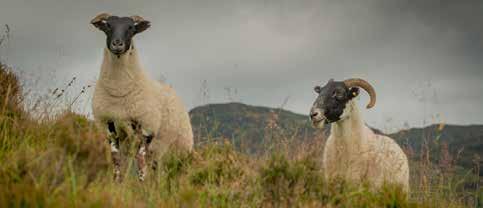
Greening requirements will not change in 2025 to ensure continuity of the benefits currently being delivered by the management of Ecological Focus Areas (EFAs). From 2026, the requirements of Greening may be delivered differently and consideration is being given as to how existing EFAs might be developed further as the platform for the new Tier 2 Enhanced payments.
New conditions will be introduced to cross-compliance in 2025 in the form of peatland and wetland standards added to Good Environmental & Agricultural Condition (GEAC) – namely ‘GAEC 6’, which relates to the maintenance of soil organic matter.
These standards will prohibit various activities like ploughing and cultivation, new drainage, and practices that damage the vegetation cover and expose the peat. The new GAEC 6 requirements will apply to land with peat soils more than 50cm deep with a near natural vegetative cover, and to wetland habitats.
To help balance productivity and profitability with reducing emissions, from 2025, a new condition will be added to the Scottish Suckler Beef Support Scheme (SSBSS). This means calves will only be eligible if their dam has a calving interval of 410 days or less.
The new condition will be measured on an individual animal basis, not on herd averages. Offspring of cattle with an established calving interval of more than 410 days will not receive a payment. The first calves registered to any dam will be exempt from the calving interval threshold so will remain eligible for payment provided that all other scheme conditions are met.
It is intended that the SSBSS will continue until at least 2028 to allow time for the calving interval conditionality to become established within the Scheme.
The Scottish Upland Sheep Support Scheme (SUSSS) will continue in its current form in 2025 and 2026. Consideration is being given to how this element of VCS may be delivered from 2027.
continued from p25
‘Baselining’ is key to informing management choices to help deliver climate and biodiversity outcomes, while driving productivity and profitability. To accelerate that, a foundation Whole Farm Plan will be a condition of BPS from 2025.
From next year, in return for BPS payments, claimants must have started carrying out plans and audits that are relevant to their enterprises. Via the Single Application Form (SAF), claimants must have done at least two of the following:


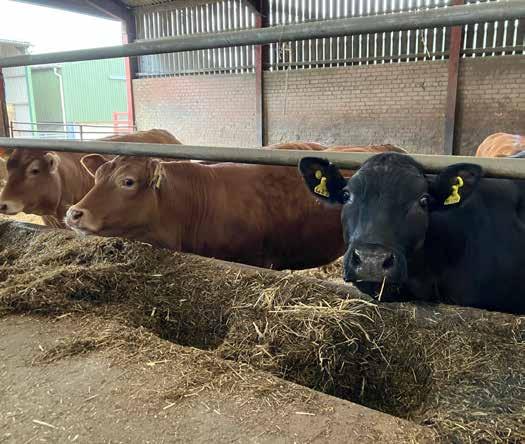
Many farms and crofts already have some of these plans and audits in place – through quality assurance or supply chain contracts, or as part of normal business planning. If so, and these meet the minimum standards, this can be simply confirmed in next year’s SAF.
Grants are still available through Preparing for Sustainable Farming (PSF) to do carbon audits and soil analysis. Act now, while support is available, to be prepared for 2025. There is also a free and simple Scottish Integrated Pest Management (IPM) tool at www.planthealthcentre.scot/scottishipm-assessment-plan
Detailed guidance on these changes, including the minimum standards of each of the plans and audits and a proportionate approach for small businesses, is expected this summer.
LFASS will continue to 2026 at least. Work is just starting on how best to deliver this type of ‘disadvantaged areas’ support under the new four-tiered framework.
It is proposed that, in the future, this funding will be made available through Tier 2 (Enhanced). However, as this remains ‘lifeline’ income support to ensure continuity of agricultural activity in remoter areas on poorer quality land this support should be a bespoke element of Tier 1 Base payments.
AECS will continue into 2026 to deliver elements of what will be the new Tier 3 (‘Elective’) and Tier 4 (‘Complementary’) support to be developed and implemented from 2027.
It is expected that the Agricultural Transformation Fund (ATF), the Crofting Agricultural Grant Scheme (CAGS), the Knowledge Transfer and Innovation Fund (KTIF), and the Food Processing, Marketing and Cooperation (FPMC) Scheme will continue until 2026 and will deliver much of the Tier 3 and 4 type capital support until new Elective and Complementary elements are developed and then implemented from 2027.
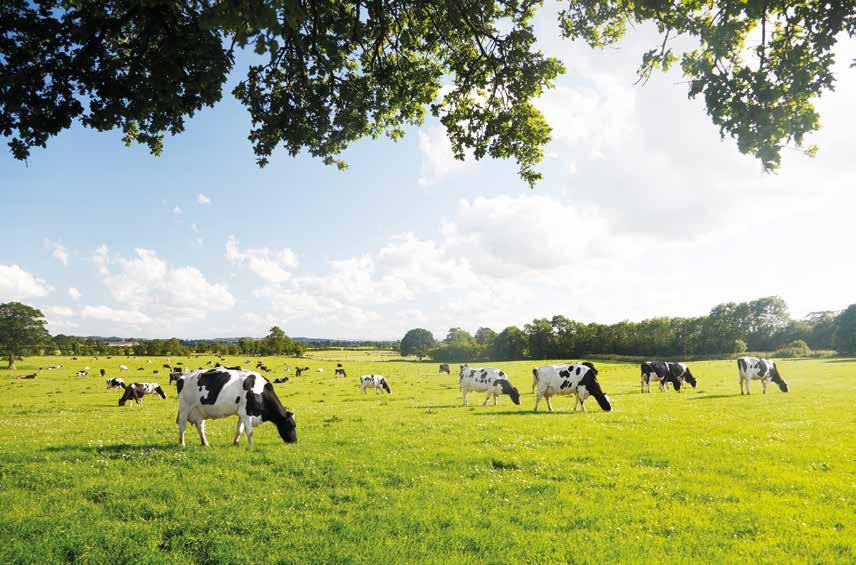

NFU Scotland has entered two teams into this year’s RSABI Great Glen Challenge and we’re looking for your support.
The teams, made up of willing volunteers of Regional and Head Office staff and Board members, will be cycling, running, kayaking and walking between Fort Augustus and Fort William on Friday 30 August 2024.
This one-day challenge is RSABI’s biggest fundraising event of the year. We’re hoping, through our participation, to raise at least £2000 to help support the charity and its amazing working providing critical financial aid, emotional support and guidance to those in need within Scottish agriculture.
It’s not for the faint hearted.
Teams are made up for four competitors plus a Driver/Team Captain who supports and ensures competitors are at their starting locations on time and collected from finishing points. They will be on hand to boost morale and keep everyone going.
The four competitors will complete one of the following elements of the race:
CYCLE: 49km RUN: 17km
WALK: 18km
KAYAK: 6km

Meet the NFU Scotland participants:
Driver/Team Captains:

Lucy McGillivary
“I really enjoyed doing the walk last year, but this year I will be Driver/Team Captain. The Great Glen Challenge is a fantastic opportunity to raise money for a worthy cause, hopefully the sun shines!”

Lisa Hislop
“Like Lucy, having walked last year, I’m excited about being Driver/Team Captain this year. I’ll be stocking up on Jelly Babies to keep everyone going.”


Kayakers: KAYAK: 6km

Mark Donald
“Last year was my first crack at the Challenge. I’d not been in a kayak for over 20 years, but finding myself on the water surrounded by bank managers, land agents, accountants and foresters provided the extra determination required to power a tenant farmer across the line ahead of the pack. The first place wasn’t the important a thing, neither was the fantastic banter, the support for a brilliant cause definitely was!”

Kate Maitland
“Who would think a day away from norm requires cycling lots of miles however it’s for an amazing charity. So many within the East Central region have benefited from RSABI support. It’s a great cause.”
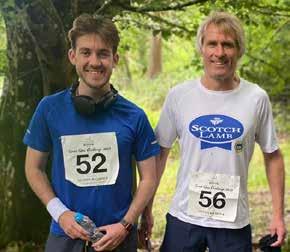



Sarah Cowie
Rhianna Montgomery
“Hoping for another calm, sunny day on the loch as I don’t know how I’d cope with choppy water.”

Diana McGowan
“I’m not used to mountain bike trails so this will push me way out of my comfort zone. I’m an adrenaline junkie and want to do my best while making our sponsors proud. The money raised will make a real difference to so many.”
Jonnie Hall
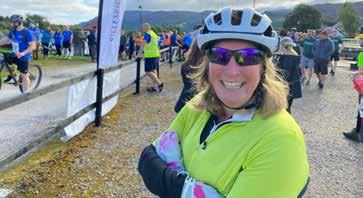
“I’ve not missed a Great Glen Challenge in years. It’s a lot of fun and raises a significant amount of money for this amazing charity does so much for those in need across Scottish agriculture.”
Al Walker
“I’m taking training very seriously. I’ve been doing some ‘army’ training sessions overseas in Germany recently.”
“I’m grateful NFUS is entering a couple of teams, and I can be part of the event. I’ll be making sure I’ve got some comfy shoes on for my walking challenge!”
Stewart Wyllie
“Participating as a Board member I want to show NFUS’ commitment to this event and RSABI’s great work. I’m not sure what to expect but it will be good to have a change of scene and hoping Mark will keep me right?!”
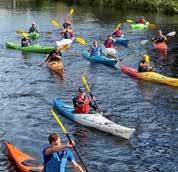

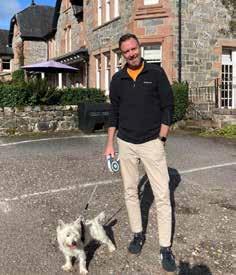
Robert Ferguson
“I’m delighted to be volunteering as part of RSABI’s operational team on event day. I’ll be helping ensure all competitors are kept on the right route and motivated to keep going.”

You can’t help everyone but everyone can help someone. Please scan this QR code to make a donation, support the NFUS teams and make a real difference to those in need.
Thank you for your support.
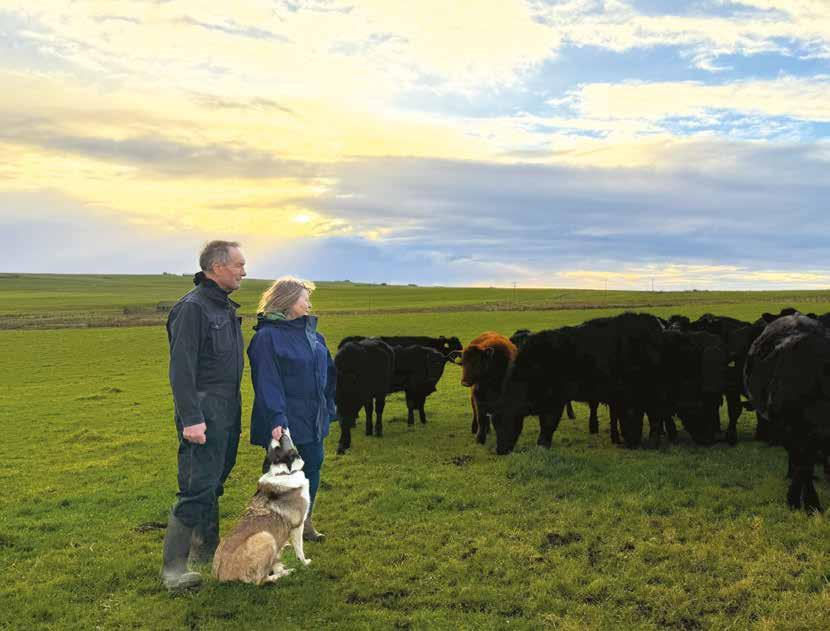
Farmer’s wife takes the plunge in support of Farmstrong Scotland by sharing her journey to a new sense of wellbeing.
Farmer’s wife and grandmother Hazel Moss describes herself as “a private person” but she has recently stepped out of the shadows to support Farmstrong Scotland. Like most people farming or crofting Hazel has found herself juggling many plates over the years. To help bring some extra money into the family’s farm on Orkney, Hazel has held down a job away from the 700-acre holding, working for the National Health Service on the governance side.
Hazel’s husband Brian and their son Peter run the farm, which has been in the family for more than two centuries. It’s all hands to the pumps though, with Hazel helping with the 175 head of suckler cattle that are to calve each year.
Then, although an absolute delight to her, the arrival of grandchildren has been another pull on her time. Interestingly though, it was watching her grandchildren Leo and Xanthe having a swim at the
beach that proved to be the key to unlocking a new sense of wellbeing - both mental and physical - for Hazel.
“I was watching them in the sea one day and they were so happy and carefree it reminded me of being a young girl myself and enjoying a swim,” she recalls.
“I set off for home and found a swimming costume and I’ve never looked back. It was a time when we had a lot of things going on at the farm and with the Covid lockdowns the whole world seemed a very stressful place.
“The feeling of peace that came over me the second I got into the sea was an instant thing. Straight away I was hooked.”
The irony of so many farming folk living among breathtaking scenery - that others so often visit in order to relax - is not lost on Hazel.
“A lot of us farmers live in beautiful countryside, but we never take a moment to stop and appreciate it,” she says.
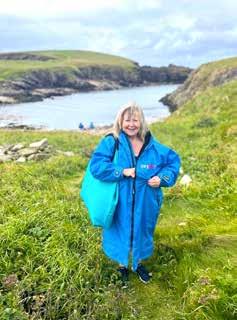
“Swimming in the clear water and doing something just for me - not for the farm or for anybody else - makes me feel a stronger person. I’ve learnt not to feel guilty about taking time to do something that makes me feel good. It gives me a bit of time and breathing space to take stock and appreciate life.”
Although getting into the sea can be a challenge in itself when the temperature

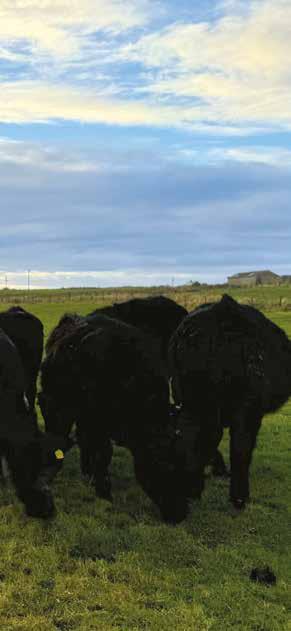



Farmstrong Scotland is an initiative to help farmers, crofters and their families to cope with the ups and downs of farming and crofting by sharing things they can do to look after themselves and the people in their business. It is a peer-to-peer led programme, driven by scientific information and real-life stories, so together we can share, learn and support our wellbeing.
The organisation is supported by RHASS, the Movember Foundation and NFU Mutual Charitable Trust, who supported the launch of the organisation.
drops, Hazel hasn’t swapped her trusty costume for a wetsuit.
“There is a feeling of strength and achievement that comes from getting into the water when it’s cold,” says Hazel, who laughs that husband Brian will often jokingly point out she needs to get out for a swim if she has missed a few days.
“I try and swim five days a week, the family can tell if I have missed a few days,” says Hazel.
“Orkney’s a small island but I’ve met new people and discovered caves and other places I never knew existed.”
When Gerard Vaughan and Marc Gascoigne, New Zealanders from the Farmstrong movement, came over to spread the word about the programme they both stayed on the Moss family farm on Orkney and joined Hazel for one of her swims.
“I took them to one of my favourite spots at the Churchill Barriers, which link Orkney with the two smaller islands of Lamb Holm and Glimps Holm,” recalls Hazel.
“Farmers are the world’s worst people for finding more jobs to do and not looking after themselves. “I am a private person, not special or a big achiever. Just a quiet farmer’s wife, but the sense of wellbeing swimming gives me makes me confident enough to urge others to find their special thing - something just for them that makes them feel good.”
Hazel encourages any readers inspired by her story, to do some research first on safe places to swim before taking the plunge.
“I encourage folk to reach out and make contact with wild swimming sites to get help and encouragement on safe places to swim,” says Hazel, who has joined other wild swimmers through a group called Orkney Polar Bears. Interestingly, this outdoor swimming club has been on the go for years, many of its members staying on after their swim to enjoy flasks of hot drinks and a chat.
“Orkney Polar Bears have been my saviour and through them I have had the help and encouragement to keep safe, find new places to swim and have great company to swim with.
A core principle of Farmstrong Scotland is its five ways to wellbeing. These are:
• Connect - developing new friendships and spending time with friends. Prioritising time away from work.
• Give - Giving your time to others, be that through supporting those having a tough time or spending quality time with family.
• Take notice - Take time to pause and think about what you appreciate. Find the simple things that make you happy and pay attention to them, if only for a few moments.
• Keep learning - Be curious on and off the farm. Learning new things is good for your brain, will keep your mind active and help you farm smarter.
• Be active - Working up a sweat releases endorphins that make you feel alert and better able to cope with challenges. Make physical activity a habit, aim for at least 30 minutes of movement a day.
“I wish Farmstrong all the very best and if a grandmother in her swimming costume helps encourage just one person to take some time for themselves then it will have been worth it.”
Trio &Tested:
Three simple steps that helped set Hazel Moss on the path to better wellbeing:
1. Take inspiration from others. It was watching her grandchildren swimming in the sea, so happy and carefree, that inspired Hazel to take the plunge
2. Be aware of the irony of so many farming folk living among breathtaking scenery but never taking a moment to notice it
3. Learn not to feel guilty about taking time to do something that makes you feel good
For more information about Farmstrong visit www.farmstrongscotland.org.uk or follow on socials search @farmstrongscot (X, Instagram and Facebook)


REGIONAL MANAGER
Ian Wilson
07775 915 988
ian.wilson @nfus.org.uk
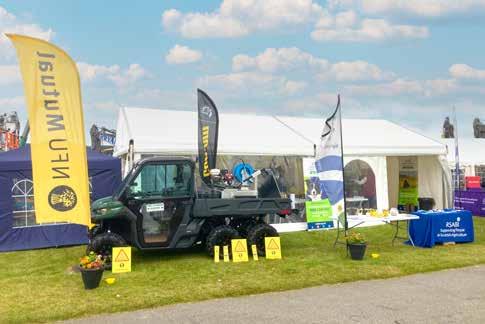
As we all move through the summer the upcoming local shows are very much on our minds as both a social day out but also as an important shop window for members of the public wishing to learn about Agriculture and how their food is produced. NFU Scotland along with NFU Mutual will have stands at a lot of these shows with your Vice-Presidents attending some in our Region. Andrew Connon will be at Grantown Show with Alasdair Macnab at Caithness, Nairn, Black Isle and

There has been a lot of interesting activity in the Region with your Board and other members heading to Fife and the Lothians recently, for four excellent and informative farm visits resulting in a lot of discussion and food for thought for those present. The only disappointment was that more could not manage to attend but I suppose, given the late spring, the pressures of work proved difficult for more to get away from. However as one member said “the work will still be there when I get back but after the last few months a day away to reset is much needed”.
As always anything that you think NFU Scotland can be of assistance to you please get in touch.
Skye. We also have our CEO John Davidson coming along to the Black Isle Show on 1 August.
We’ll have catch ups with our MSPs and MPs at the show – who our MPs will be known by then following the General Election on 4 July, hopefully whoever is in power will listen to the needs of Agriculture and value properly what we all do.
Please call in to the NFUS/NFU Mutual stands for a cuppa and the opportunity to catch up with office holders, staff and NFU Mutual agents.
We’ve had a few good Board discussions around the following - future payments, funding, beef calf scheme, slaughter capacity, replacement scheme for LFASS, Maltsters, Land Reform and utilities to mention a few.
Hopefully the summer will be kind to us all with enough warmth and dryness to get on with work easily but also enough rain to keep everything growing. If that happens the challenges of the spring will be well and truly forgotten and everyone a bit happier.
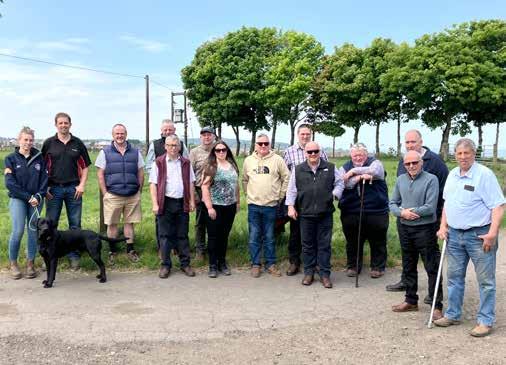

REGIONAL MANAGER Mhairi Dawson
07718 425 053 mhairi.dawson @nfus.org.uk

REGIONAL MANAGER
Sheena Foster
07789 796 582
sheena.foster @nfus.org.uk
Thank you to everyone who visited our stand on Saturday 11 May. We couldn’t have asked for a more beautiful day for this year’s Ayr Show putting everyone in a good mood and ready to socialise. Our family area was very popular with children colouring in scarecrows and by the end of the day we had a stunning display on our straw bales.
Ayrshire Regional Chair John Kerr and the Union’s President Martin Kennedy were on hand all day talking to members and answering any queries. We were delighted to have NFU Mutual, RSABI, NFU Scotland Finance, the Scottish Dairy Hub and ATV Services Scotland all represented on the stand. The stand was organised by Forth & Clyde’s Regional Manager Sheena Foster with Holly being on maternity leave but it was lovely to see Holly visiting the stand with her family. Holly was presented with flowers from the region to congratulate her on the safe arrival of Freddie.
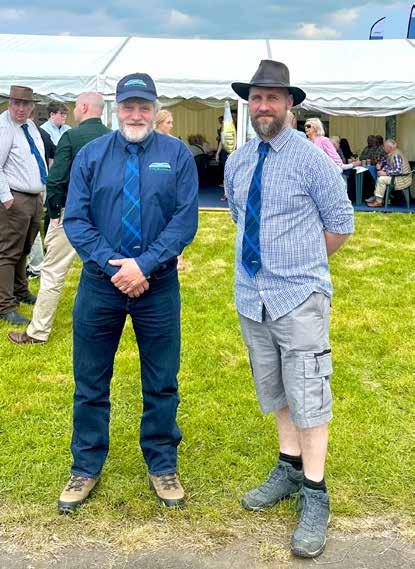
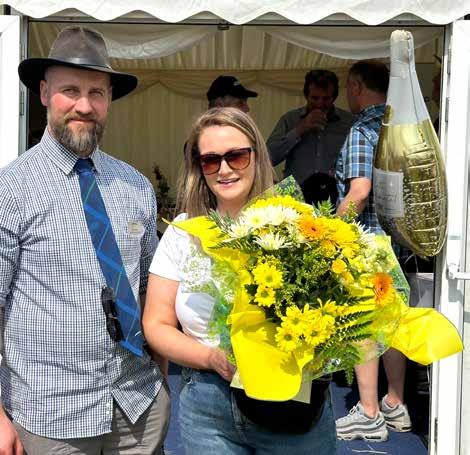
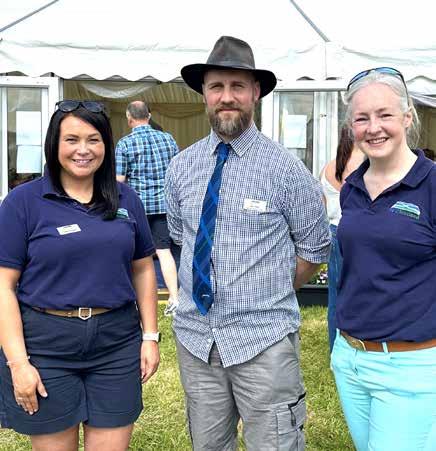

LOTHIAN & BORDERS

REGIONAL MANAGER
Lindsay Brown
07780 441 750
lindsay.brown @nfus.org.uk
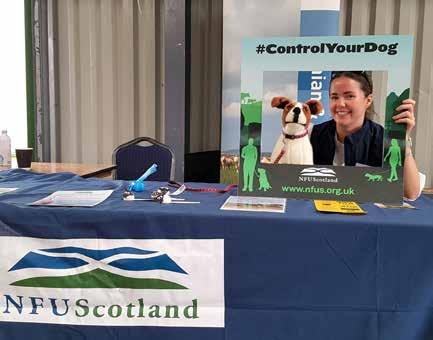
At Springwood, Kelso another successful Border Schools’ day took place with lots of different rural organisations coming together to put on a fantastic display of rural life and focusing on where your food comes from. Over 1200 P5 children from 59 schools were bussed to Springwood for this epic day in the school calendar. We focused on controlling your dog around livestock and picking up after them.
The Shanks family welcomed members to their farm where fifth generation Jim Shanks took us through the process of how his innovative ideas developed and they became the largest tomato producer in Scotland. Starting out with the dairy slurry they had goes into their AD plant which produces green electricity and with the additional heat they dry wood chips and heat their 200m x 80m glasshouse to produce high quality tomatoes which are sold in many of the major supermarkets.
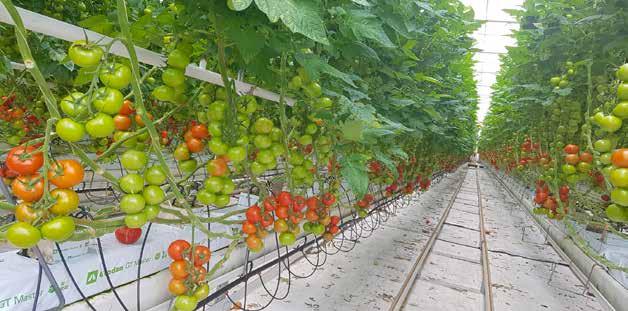

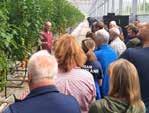
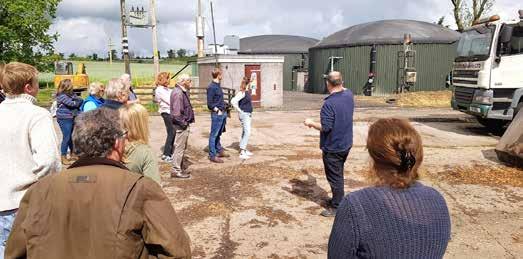
Everyone is welcome to join our Farm Visit to Bee Edge Farm, Eyemouth on Friday 12 July 5.30pm. Run by the Hamilton family we will take a look round the cattle and crops. Register to attend at www.BeeEdge.eventbrite.co.uk or call Lindsay on 07780 441750
At the end of the month, we will be at Kelso Show as usual, with a place to come and have a seat, grab some refreshments and catch up with friends.









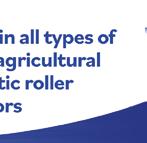








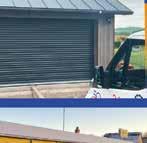


REGIONAL MANAGER
Mhairi Dawson
07718 425 053
mhairi.dawson @nfus.org.uk
Langholm branch is working hard to get The Missing Lynx Project to agree to a member meeting on the proposed Lynx reintroduction so we can share our views. The project hopes to see a “healthy population (of lynx) covering north-west Northumberland, the edge of Cumbria and the bordering areas of southern Scotland”. Members are encouraged to attend the projects consultation event on Moffat (14-18 August) if they missed the earlier one held in June.
The Dumfries and Galloway division of RHET are seeking some new volunteers to host school visits on farm and to go into schools to do classroom talks. Currently, they really need people around the Wigtown and Stranraer areas. If you can help please contact the local Project Coordinator Jessica Miller on 07594 944590 or dumgal@rhet.org.uk
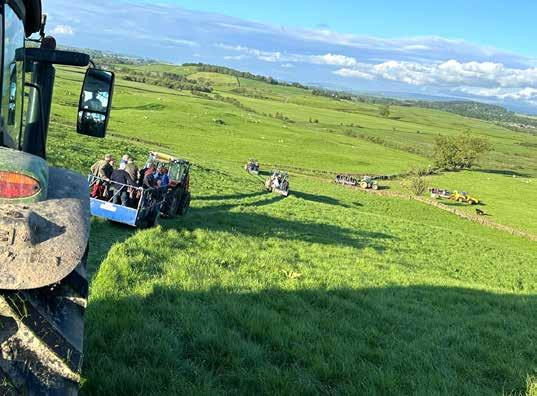
Stewartry and Dumfries branches held a joint farm walk at Balannan Farm near Castle Douglas. The evening was well attended and over XX members were able to see how the 560 suckler cow and 300 sheep systems operates. Thank you very much to Alex, Dawn, Matthew and Alison Millar for hosting us.

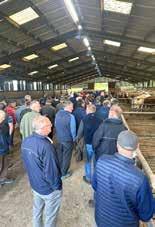
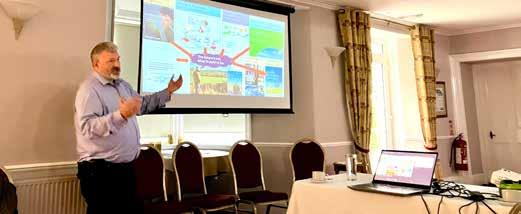
Since we got over the spring work hurdle, there has been quite a bit of branch activity going on. Wigtownshire branch opened their doors to all D&G members and welcomed SRUC’s Professor Steven Thomson to hear his thoughts on “Agricultural Policy; The What, How and When”. Although we had a smaller turn out than anticipated, all four branches were represented, and members were able to enjoy a lively discussion with Steven.
We look forward to seeing members on our joint NFU Scotland and NFU Mutual stands at Stranraer Show (31 July), Dumfries Show (3 August) and Wigtown Show (7 August). President Martin Kennedy will be at Stranraer whilst Andrew Connon will attend Dumfries & Wigtown. CEO John Davidson and Livestock and LFA policy manager Lisa Hislop will also be at Dumfries Show.

REGIONAL MANAGER
Sheena Foster
07789 796 582
sheena.foster @nfus.org.uk
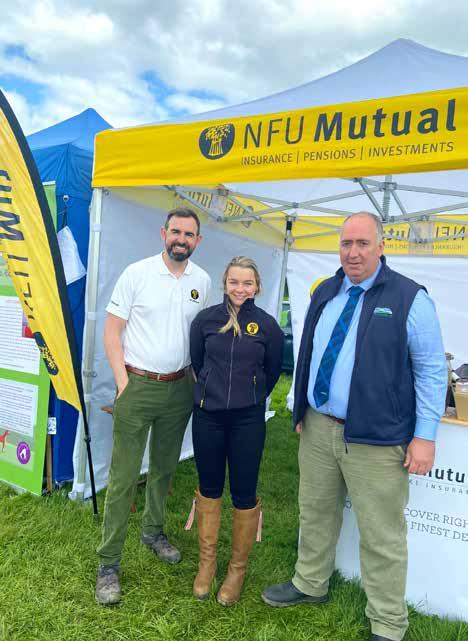
Drymen show was the first of this summer’s agriculture show stands for Forth and Clyde, and was organised by Gavin Maxwell and the team from the Bearsden Office. James Buchanan, Head of Members’ Services joined them, and a great day of member engagement was had by all.
With rural crime still a threat to the rural community, have you heard of Rural Watch Scotland? This is an extension of the Neighbourhood Watch movement and a product of the Scottish Partnership Against Rural Crime (SPARC) aimed specifically at rural communities. By joining the Rural Watch Scotland Scheme you can receive alerts and advice by phone, text or email, keeping you informed about crime and other threats in your area. To read more or to join Rural Watch Scotland simply click the green JOIN button at www.ruralwatchscotland.co.uk

REGIONAL POLICY ADVISOR
John Laughton
01856 872 048
john_laughton @nfus.org.uk
Our week-to-week activities as Regional Policy Advisors are wide and varied.
As well as being here for our members, assisting with any queries and issues they have, we (Nicola Tait and myself) are involved with a number of local stakeholder groups. Recently we have been heavily involved in the potential new Orkney abattoir, the recent study by Professor

Steven Thomson on Rural and Agricultural Development ‘Maximising the Potential in the Islands’, the Orkney Greylag Goose Management Group, the Sustainable Development Delivery Group (including the farming and environment sub-group), Good Food Nation Act Orkney consultation, Orkney woodland group, Islands’ Centre for Net Zero and various careers events. Wide and varied is perhaps an understatement!
Succession continues to be a massive talking point for the industry, not just at farm level but also the numerous up and downstream industries and sectors which support and rely on grassroots farming. Our engagement with school children, from Primary 7 all the way up to secondary school leavers, is

therefore vital and has been very positive in that there are a healthy number of pupils keen to pursue a career in agriculture. Not only that but their knowledge of the sector is good. We are under no illusion though that the job market is highly competitive with all sectors keen to tackle staff and succession issues. We therefore have to ensure that the industry is profitable and that returns are inline with the huge effort and time that is spent producing top quality livestock, milk and crops.

REGIONAL POLICY ADVISOR
Lee Smith
07554 741 030
lee.smith@nfus.org.uk
As we are into summer and the longer days here in Shetland you would hope electricity bills would be on the decline. Members have repeatedly reported having issues with standing charges on Agricultural buildings. These building are often left dormant during the summer months, due to doing more work outside and very little electricity being used. However, there have been three different cases locally where members have been charged £2000, £3000 and £5000 by electricity companies. One member has taken action and having sought advice from NFU Scotland has now moved supplier.
Beatice Morrice, the Union’s Political Affairs Manager, continues to raise this at
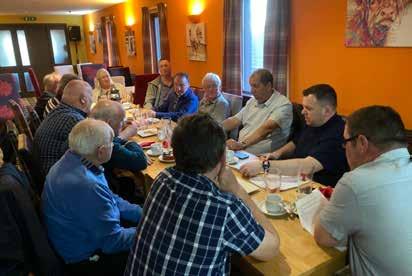

REGIONAL MANAGER
Lorna Paterson
07786 860 453
lorna.paterson @nfus.org.uk

Members enjoyed an interesting and frank Regional Board meeting with CEO, John Davidson in mid-May, where policy matters, regional activity and recruitment were well discussed.
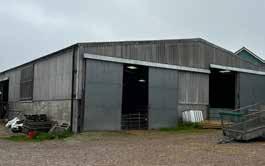
parliamentary meetings. This has been ongoing for some time, and you may remember last year Beatrice requested information on Agricultural electricity charges.
I would urge members to contact their local Regional Manager if you have had any issues with Agricultural electricity charges so this issue can continue to be acknowledged and presented to parliamentarians.
New Deer Branch members enjoyed the New Deer Show planning meeting in late May, with great discussions and ideas for politician and councillor meetings and a BBQ and Drinks Reception on the Saturday (20 July). Woodheads of Turriff are generously sponsoring the beef burgers, and there will be a raffle to raise monies for Branch Funds. We will also formally launch our NFU Scotland North East Mental Health ‘FarmTalk’ at 3.30pm on the stand, to which we have invited Provost Judy Whyte to officially explain more about the uniqueness of ‘FarmTalk’ within the agricultural industry.
Thank you to everyone who kindly donated to RNCI via Aberdeen Kiltwalk. Ali Johnston, Tyne and I had a brilliant day with smashing weather and raised over £2500 for this brilliant charity. Really grateful for your support. Special thanks must go to local Group Secretaries: Andy Mackle, Stephen Hepburn, Sarah Law, Tommy Brodie, Ross Silvers, Richard Thompson and Rosslyn Reid for being key sponsors. Also to Claire Green and Stuart Johnston for chauffeuring us to and from Kiltwalk.


The region’s Combinable Crops Chairs Scott Campbell, Russell Rennie and Charlie Catto welcomed members and SQC Chair, John Hutchinson, to our local meeting. Members are highly impressed with John Hutchinson and many of his ideas. SQC have stepped back from Digital Grain Passports (DGP) and changed their position from being “in favour”. This was good news for many members in the room.

REGIONAL MANAGER
Kate Maitland
07919 001 23 kate.maitland@ nfus.org.uk
(Friday 2nd & Saturday 3rd August) Perth Show is nearly upon us. If you plan to attend the show, then please pop by and say ‘Hello’. Myself, Margaret Hebbourn, Katy Neil, Marc Robb and Union’s President Martin Kennedy will be attendance and we’ll be more than happy to address any matters of concern.
The Union will also be at the Braco Show on Saturday 27 July and the Aberfeldy and Kinross Shows both on Saturday 10 August. We look forward to seeing you.
“It’s been brought to our attention that I failed to mention the name of our new Regional Chair in last month’s issue – his name is Robert Bell, Levenview, Westhall Milnathort. Robert is past-Chair of the West Fife and Kinross Branch.”
ARGYLL AND ISLANDS

REGIONAL MANAGER
Lucy Sumsion
07787 434 104 lucy.sumsion @nfus.org.uk


NFUS/NFU Mutual had a fantastic day at the 202nd Fife Show. Such a great opportunity to touch base with members and hear the positives and negatives of everyday life.
We have just completed a successful round of parliamentarian meetings sneaked in before the Prime Minister announced the General Election. These sessions are not all about actions, we aim to increase their knowledge gap and reiterate the importance the role agriculture plays in the rural economy. We all need to grasp every opportunity to educate those with political influence whether it’s civil servant advisors, local councillors, MSPs or MPs. Should you wish to invite anyone of the afore mentioned on to farm, please do get in touch and we can help facilitate.
Over 30 members, from across the region, gathered at Glenbarr in mid-May for lunch followed by a farm walk at Glenbarr Farms, courtesy of Regional Chair, Duncan Macalister. Lisa Hislop, Livestock and LFA Policy Manger joined the meeting and gave members a useful update on the reformed SSBSS (calf scheme) and proposals for future LFA support. Members were concerned about various aspects of the changes to the calf scheme, and the discussion highlighted the need for farmers and crofters to register dead calves as well as live ones.
During the farm walk members
were able to see some of the changes Duncan has continued to implement since he was a monitor farm. This has included introducing a homebred herd of Black Baldy cattle, and the benefits of rotational grazing. Duncan outlined his ongoing drainage plan and land improvements to enable the farm to produce more barley, both for homegrown feed and selling locally in Kintyre. The farm walk also included seeing the community windfarm, which Duncan developed in partnership with Fyne Homes, with profits from the project distributed across initiatives including investment into the local community.


In partnership with NatureScot, and the Monitor Farm group, the Islay branch held a wellattended meeting in May to gather feedback from farmers and crofters on the Agri Environment Climate Scheme (AECS). The focus for the meeting was the current scheme options and barriers to their uptake. Islay and Colonsay are particularly important for supporting populations of both chough and corncrake. A significant part of the discussion focused on the barrier to entry (upfront cost and competitive nature, skewed towards larger farms and SSSIs). Farmers and crofters felt that the current scheme is maintaining the status quo rather than allowing species to spread to adjacent land parcels.
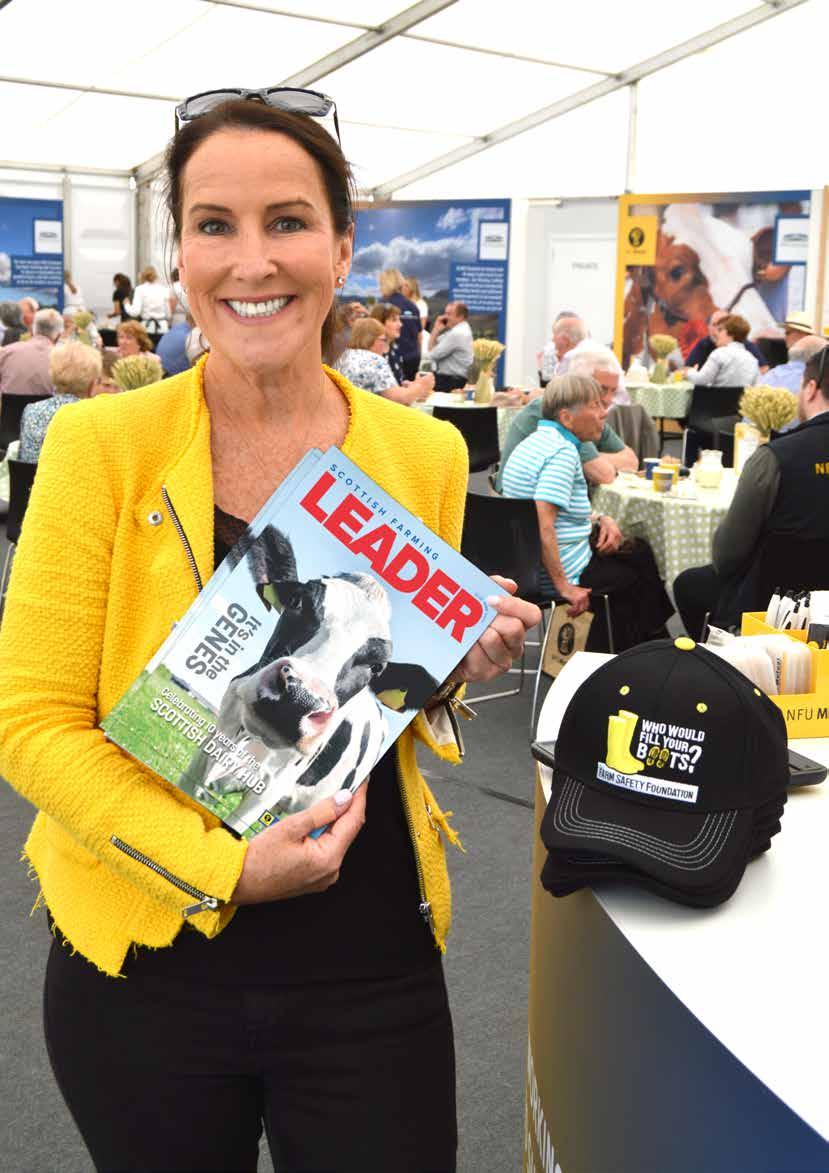
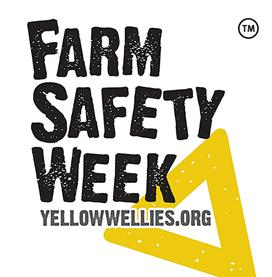

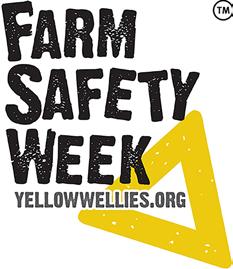
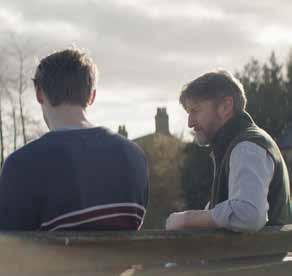
Farm Safety Week takes place from 22-26 July - a campaign managed and funded by the Farm Safety Foundation (Yellow Wellies). Farm Safety Week has become an important focus in the farming calendar and is supported by more than 400 partners including the farming unions, agricultural businesses and organisations in five countries - England, Scotland, Wales, Northern Ireland and the Republic of Ireland.
This year is a special one for the Farm Safety Foundation as it marks 10 years since the charity was set up by leading rural insurer NFU Mutual with the goal of raising awareness of, and challenging attitudes to farm safety and poor mental health in the industry.
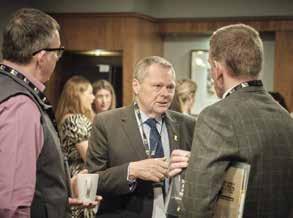
Each and every farmer and crofter in Scotland needs to rethink the risk when it comes to safety on our farms and crofts says Vice-President Andrew Connon. Andrew attended and joined a panel session at the Farm Safety Foundation (Yellow Wellies) 10th anniversary conference
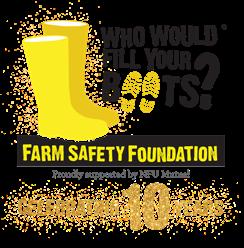
Over the past decade, the small but mighty Yellow Wellies team have been delivering an ambitious education programme, conducting important research and mounting awareness campaigns - Farm Safety Week and Mind Your Head – all with the goal of equipping the farmers of tomorrow with the skills and knowledge to live well and farm well.
According to Stephanie Berkeley
have lost in the industry and too slow for the thousands of farmers suffering every day with long term ill-health, serious injuries or poor mental health.”
This year’s Farm Safety Week will again highlight some of the key challenges farmers and farm workers face every day and will throw a spotlight on the dangers of ignoring near misses and highlight that every near miss can be an opportunity to improve working practices. The team will again introduce audiences to incredible individuals who are using their own personal experiences to encourage others to stay alert to the hazards on farm and offer practical guidance on how to make these jobs safer for everyone involved.
I’ve always done it that way. I’m in a hurry. It costs too much…
We’ve heard these excuses for years but there should be no excuse for risk-
Farm safety is an investment not a luxury so invest in your future. You’re worth it.
who manages the charity: “Ten years have passed quickly and we are proud of what we have achieved but there is so much more to be done to address the massive challenges we have in the industry. Attitudes and behaviours around farm safety and mental health may be changing but the pace of change is slow – too slow for the families of those we
taking, poor maintenance of equipment or unsafe working, especially when lives are at stake. Farm safety is an investment not a luxury so invest in your future. You’re worth it.
Please get involved. Follow us on social media @yellowwelliesUK and share your concerns, your solutions and your experiences.
Rethink the risk on farm safety for the sake of family, colleagues and friends
held near Birmingham in May, where the impact farm accidents and fatalities have on lives and the industry’s appalling record hit home hard. There have been 32 deaths on UK farms this past year and there are, on average, a further 23,000 reported cases every year of long-term ill health or serious injury within the agricultural industry. Following his attendance and participation in the conference, Andrew wrote a blog which is available to read on the NFU Scotland website. He reflected: “As an industry, we must be under no illusions of how poor our record on safety is. While farming makes up one percent of the working population of the UK, it
accounts for 16 percent of all workplace deaths. It is apparent that despite making great strides to tackle mental health and wellbeing, we are still failing to address farm safety adequately.”
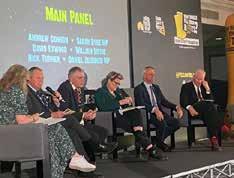


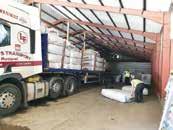

Free haulage from all British Wool drop-off sites.
We understand that our members face increasing cost pressure, which is why all deliveries to British Wool drop off sites now benefit from free onward haulage. As a farmer co-operative owned by sheep farmers, everything we do is about adding value to British wool to maximise the returns to our members. We do this by efficiently collecting, grading and selling British wool, minimising price volatility and maximising returns.
We recognise that wool prices have been under pressure but, in these uncertain times, you know it pays to stick together. And, with our expanding network of collection sites, it has never been more convenient.
To find your nearest site visit britishwool.org.uk/depot-network
Together we’re growing something special.


ORhianna Montgomery Policy Manager
ver the last 10 years, almost one person a week has been killed as a direct result of agricultural work. Many more seriously injured or made ill.
Falling from height is the second highest cause of death in agriculture, so it is important that you are aware of how to stay safe when working at height. Falls often happen from roofs, lofts, ladders and vehicles. They also commonly occur from unsuitable access equipment such as buckets. Any building work, including roof work, is usually classified as specialist work and therefore is best carried out by professional contractors.
The law states that you should follow these rules in order when considering working at height;
Avoid work at height where you can and if not;
• use work equipment or measures to prevent falls and if not;
• use work equipment that minimises the distance and consequences of a fall.
Working on fragile roofs is extremely dangerous, especially without the correct equipment. No one must ever work on or from, or walk over, a fragile roof unless platforms, covers or similar are provided which will adequately support their weight. To avoid accidents, it is always best to use professional contractors when carrying roof works, or any works from height.


Following a spate of unfortunate accidents involving agricultural machinery and overhead powerlines, NFU Scotland has collaborated with Scottish Power Energy Networks to bring you some top tips to keep yourself safe.
There are overhead power lines crisscrossing the country. Often unnoticed, they are essential to providing electricity to cities, towns, villages and rural communities. They carry voltages ranging from 230 volts (domestic) up to 400,000 volts. Even domestic voltage can be fatal and high voltage electricity can jump large gaps.
On average, two people are killed,

whilst others endure life changing injuries every year in the UK when equipment or machinery comes into contact or close proximity of overhead power lines.
To keep yourself safe, here is some general safety information.
• Always assume powerlines are LIVE, even if they have fallen to the ground, are broken or are not sparking.
• Stay away from any person/object in contact with an overhead line and keep others away… touching them/it can be fatal.
• Phone 105 – SPEN will be able to make the line safe remotely.
• Damaged lines can stay live or be reenergised automatically or remotely if SPEN is not aware of an incident.
• Never touch overhead lines.
• Always take note of overhead lines and stay aware of them when operating machinery.
• Almost any material can conduct electricity.
- Chainsaws
- Extendable hedge cutters
- Window cleaning poles
- Ladders
- Scaffolding
- TV aerials
- Kites
- Fishing rods
- Tree sap
- Wet branches
• Rubber boots will not protect you.
• You do not have to be in direct contact with electricity for it to be fatal.
With You. Through the seasons

agriculture@eqaccountants.co.uk
Let’s cultivate a stronger future together. www.eqaccountants.co.uk
Scotland’s farmers face unique challenges. At EQ Accountants, our expert agricultural team offers tailored financial support and strategic planning to help you thrive. Meet us at summer agri shows or contact our specialist EQ Agricultural team today.
Please feel free to get in touch on the numbers below:
Forfar 01307 474 274
Dundee 01382 312 100
Edinburgh 0131 357 7960
Kelso 0157 322 5082
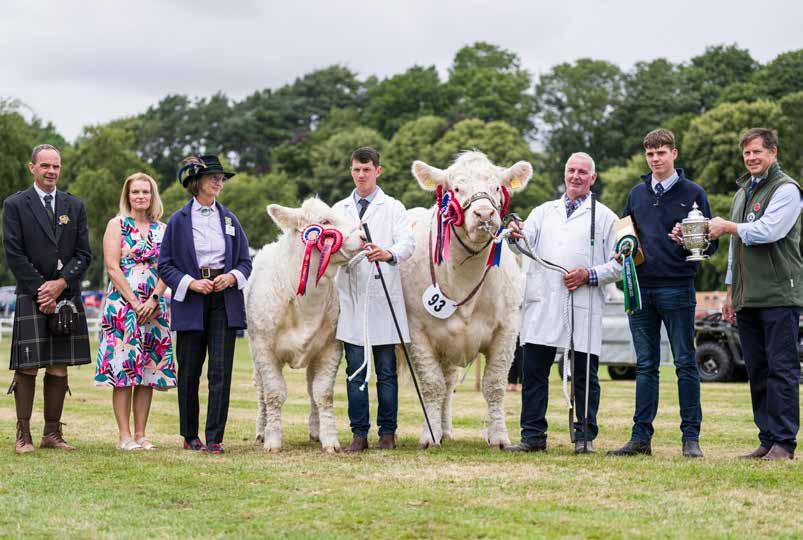

This year celebrates the 160th anniversary of Turriff Show –Scotland’s largest two-day agricultural event – which is set to take place on Sunday 4 to Monday 5 August. Each year, the showground comes to life, welcoming those from near and far to experience the very best of northeast farming, food & drink, and local heritage. The show’s lead sponsor for 2024 is Melrose Farms & Haulage – a familyrun agricultural & haulage business near Banff, Aberdeenshire.
In 2023, the show attracted over 24,000 visitors, on what turned out to be two inviting days of bright sunshine. The vibrant crowds made their way around 300+ exhibitors’ stands, witnessing the impressive Vintage & Classic Vehicle Display, sulky racing and dog showing, whilst tasting the very best of Scottish Food & Drink.
Turriff Show is highly regarded on the ‘show circuit’ for a host of livestock, equestrian, small animal and dog classes, awarding one of the largest ‘prize pots’ in the UK. In total 330 trophies are presented and over £88,000 is paid in prize money across 1,500 exhibitor classes. Animal classes include prime cattle, sheep, horses and ponies, rabbits, cavies, dogs, and pigeons. Industrial and craft classes




are for skills including baking, vegetable growing and flower arranging.
All the way from Crufts to Turriff, ‘Kipperridge Gundogs’ are set to retrieve the spotlight in the main ring this year, as they demonstrate worldclass canine displays. Some woolly performers will be also taking to the stage in the sheep section, with ‘The Sheep Show’ to provide entertainment over the two days.
“Scotland’s biggest two-day agricultural show has been one of the key dates in my calendar for as long as I can remember. From attending member to sports convenor in 20042019, it is a pleasure to be main sponsor and President because there’s nothing better that connects agriculture to the people as brilliantly as Turriff Show,” said David Allan, President and Main
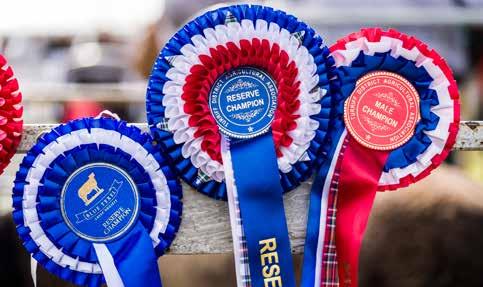

Sponsor. “We are thrilled to host the Scottish National Bluefaced Leicester Progeny Show and the Scottish National Simmental Summer Show this year,” he continued.
Gail Greig, Turriff Show Secretary added “There is nothing quite like Turriff Show - a fantastic family day out to experience a range of activities, and dive into the world of farming with a taste or tipple of its produce.
“New to the showground - a horseshoe shaped marquee combining the arts and crafts display, shopping mall and exhibition all in one - will be situated next to the food and drink stands. The EQ Food and Drink Pavilion continues to be one the largest growing attractions, as exhibitors showcase a rich supply of the region’s finest food, including meat, dairy, fruits, home bakes, preserves, and local drinksbeer, gin, and whisky.”
David Allan concluded, “I hope this year’s show will be a light at the end of a tunnel, for what has been a wet and soggy start to the year. Whilst good weather is always warmly welcomed to Turriff’s agricultural event - it is the dedication and commitment from our wonderful volunteers, members on the committee, exhibitors, and sponsors, and large attendance from our visitors that truly make the magic happen.
“We want all visitors to be able to attend whether it be for one day or two, so our advice is to purchase your tickets online via our website to save money and ease showground entry on the day. We look forward to welcoming you all down at the Haughs in August.”
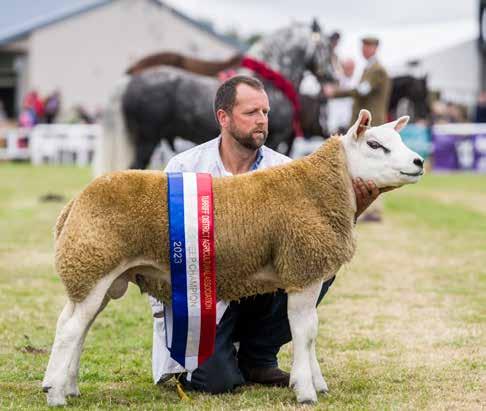
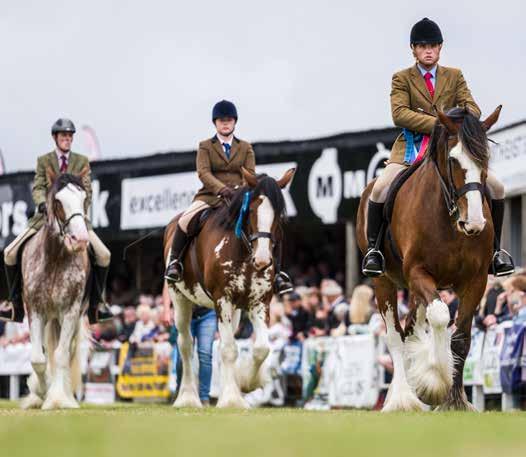


Speak to your local Machinery Ring about opportunities when purchasing Case IH tractors, combines and balers.
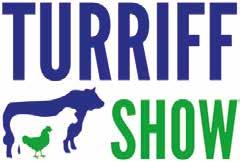
NFU Scotland will once again be at the Turriff Show – please do come and join us for a chat and cuppa with the team including the President Martin Kennedy, Vice-President Andrew Connon and CEO John Davidson. For tickets and further information about the Turriff Show 2024 visit www.turriffshow.org
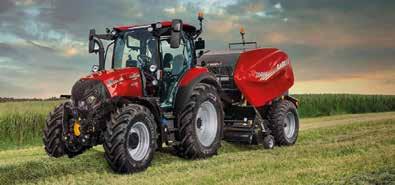




• Domestic • Commercial • Industrial
• Maintenance • Landlord Certification
• Smoke & Heat Alarms • Electrical
Installation Condition Reports (EICR)
• Joinery Services • Decoration Services
• Maintenance Packages • Renovations
• Window & Door Installations
• Kitchen & Bathroom Installations














Use Solar PV and SunSynk to reduce reliance on the grid by running your home o solar during the day and stored energy during the night. Ba eries installed alongside Solar PV and hybrid inverters allow you to store electrical energy to use in your home. Manage and control your energy use in real time with the SunSynk app. These systems are compact and easy to install and can be expanded at any time. When a system is fi ed by a SunSynk-approved installer, it’s covered by a 10-year warranty. NSB Contracting Ltd are currently the only approved installer in Scotland.



CONTACT US
Strichen, Fraserburgh, Aberdeenshire, Scotland, AB43 6SE Email us: info@nsbcontracting.co.uk Call us: 01771 653847 www.nsbcontracting.co.uk

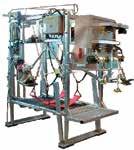





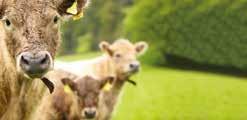










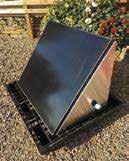

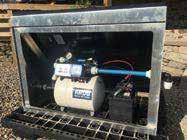
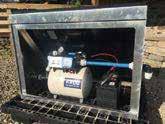





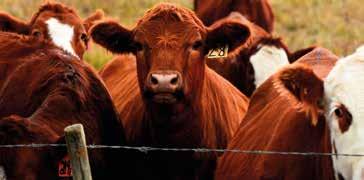




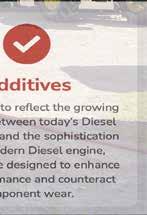



Scottish Machinery Rings are working in partnership with Case IH dealers to provide an exclusive rebate for members on their latest machines, including the popular Vestrum, which can now be ordered with another impressive transmission alongside the renowned the CVXDrive.
Delivering the perfect balance of agility and power, the ActiveDrive 8 gear box features advanced Dual Clutch transmission for seamless shifting, bring a range of handling advantages such as increasing field speed without interrupting power to the wheels and coming to a standstill using only the brake pedal.
DEALERS (MAIN DEPOTS)
AL Agri, Forfar, 07709 215713
Davidson Tractors Ltd, Newton Stewart, 01988 840272
Everitt & Marshall Ltd, Hexham, 01434 603194
G Marshall Tractors Ltd, St Boswells, 01835 823240
Glenside Tractors Ltd, Campbeltown, 01586 553624
J & W Tait Ltd, Kirkwall, 01856 872490
J Low Agri Services Ltd, Kelty, 01383 830220
Mark Garrick Ltd, Elgin, 01343 860556
Paxtons, Alnwick, 01665 605577
R C Dalgliesh, Lockerbie, 01576 202422
Ramsay & Jackson Ltd, Mauchline, 01290 550329
MACHINERY RINGS
Borders, 01896 758091
Caithness, 01955 608865
HBS Ring, 01463 811603
Lothian, 0131 339 8730
Orkney, 01856 879080
Ringlink Scotland, Rural Services Scotland, Tarff Services, Tayforth,

